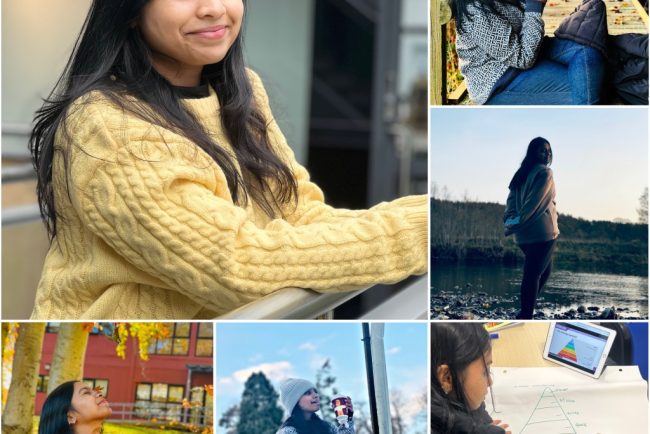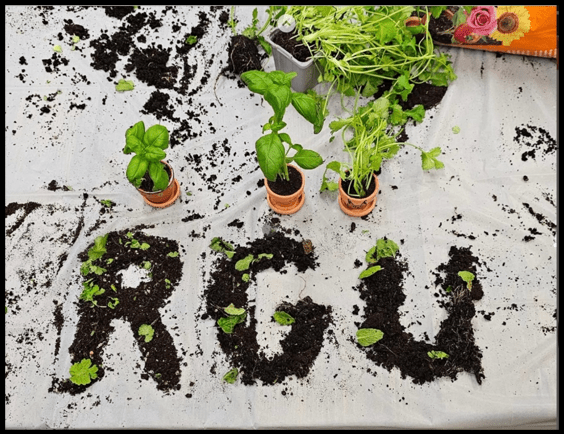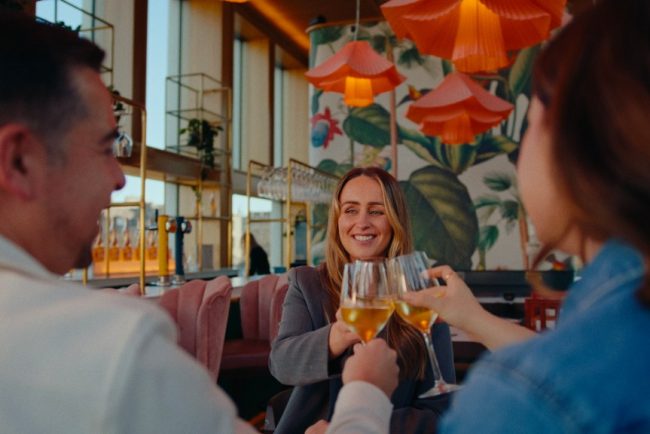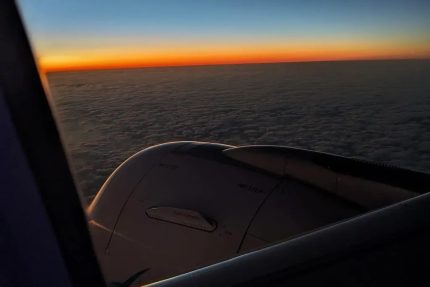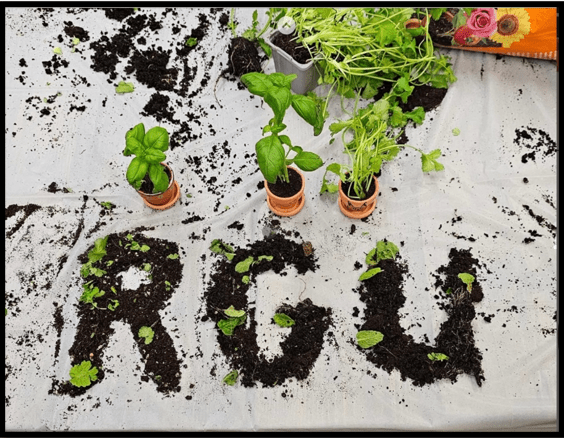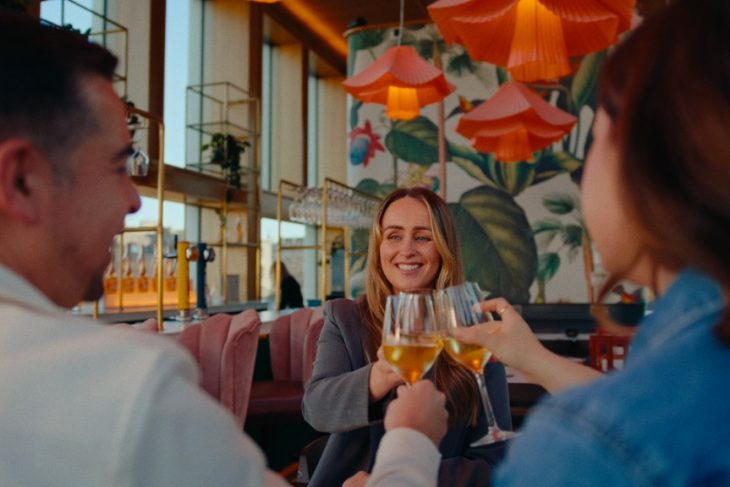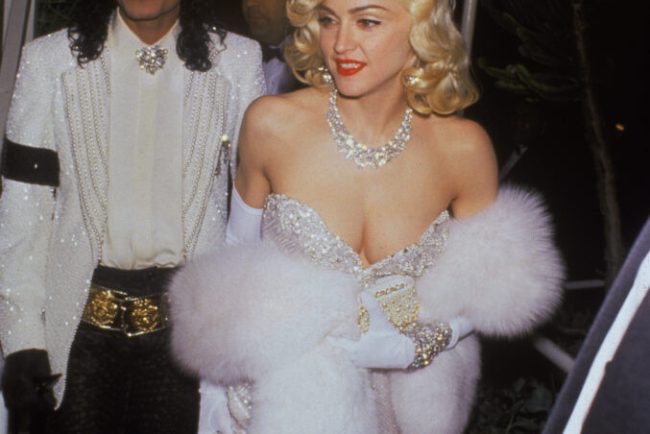
Madonna (and Friends) Striking Poses
In the 1980s and 1990s, Madonna was such a big star that people started comparing her to Marilyn Monroe. Madonna had the hit songs, of course—such as Like a Prayer and Vogue, to name a couple. But as the reigning sex symbol of the MTV […]
People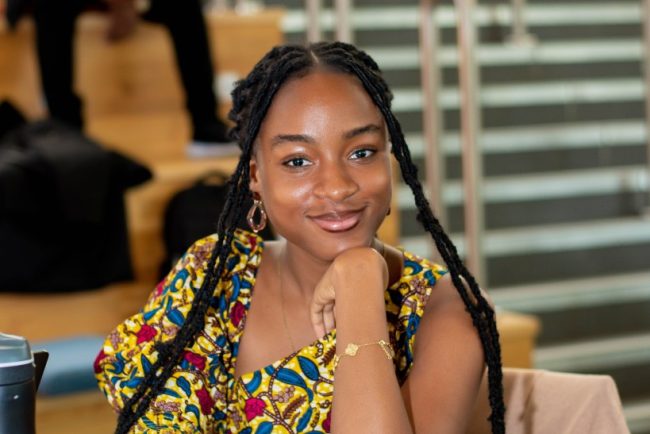
Studying Public Health and Health Promotion at RGU
After working as a pharmacist in Ghana, Adanna Blessing chose to move to Aberdeen to study a master’s in Public Health and Health Promotion to be better equipped to advocate for women and children’s health. She shares her experience as a student, from the learning […]
Student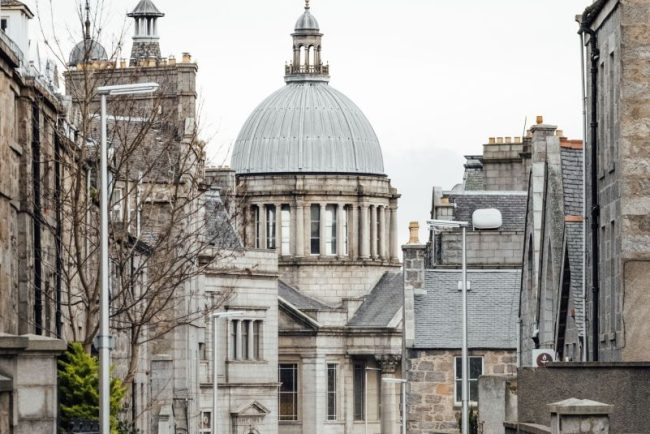
Top tips to finding accommodation in Aberdeen as a student
With the academic year coming to an end for many students, it will now be time to pack up and find somewhere new to live in September if you are going back to university. RGU ResLife shared with us five top tips to finding accommodation […]
Student

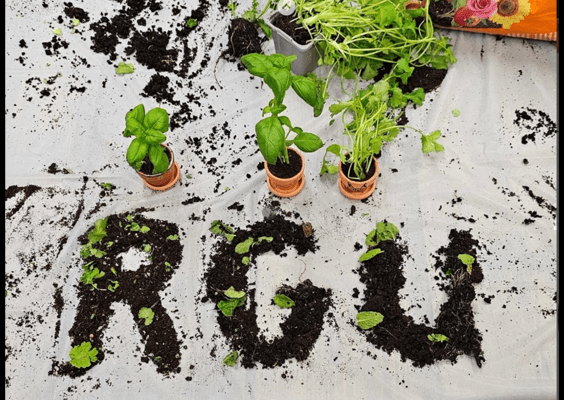
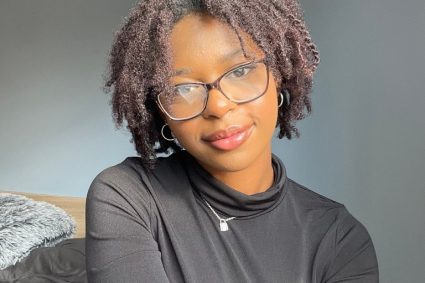
My Pharmacy journey so far at RGU
Pharmacy student Eva shares why she decided to study at RGU, the highlights of the course so far, including a volunteer placement in Spain, and advice for prospective students. Why I chose Pharmacy Choosing a career is never easy, but when I learned about pharmacy, […]
StudentPharmacy student Eva shares why she decided to study at RGU, the highlights of the course so far, including a volunteer placement in Spain, and advice for prospective students.
Why I chose Pharmacy
Choosing a career is never easy, but when I learned about pharmacy, it was a natural fit. I’ve always been intrigued by the creation of medication, the biology and chemistry behind it and how it works to improve lives. What made pharmacy even more appealing was the variety of career paths it offers such as community, hospital, primary care and my favourite, industry and more!
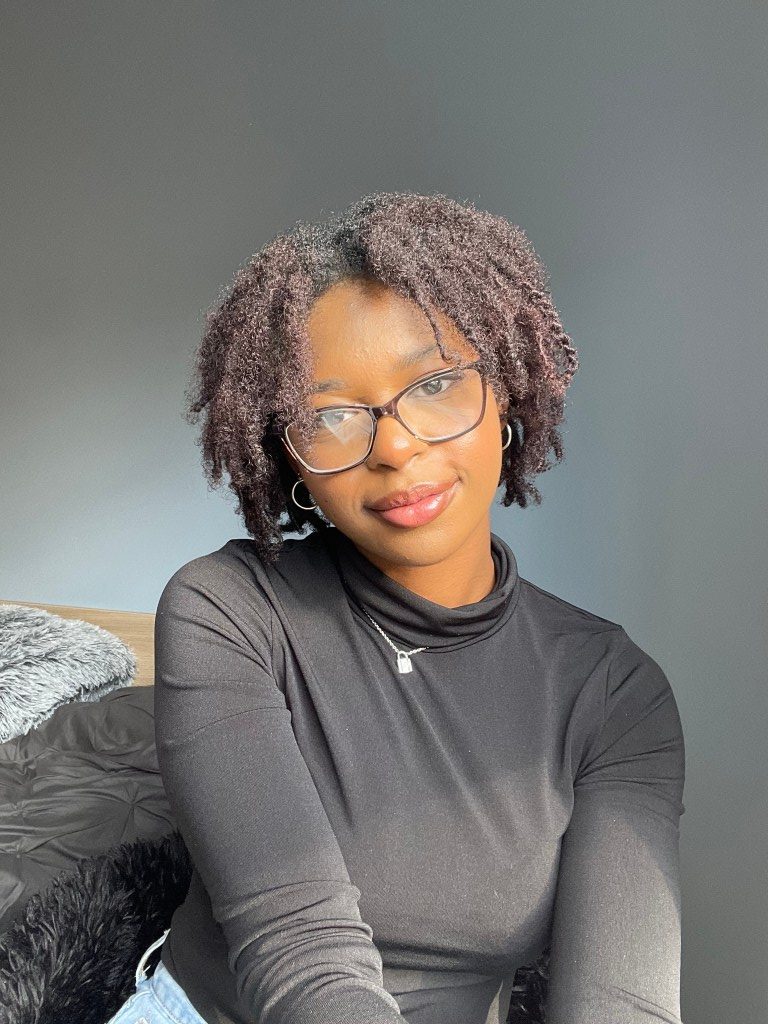
As someone who loves to learn and upskill, the idea of being able to work in different sectors of pharmacy throughout my career was exciting and refreshing to know.
Why I chose RGU to study
When it came to choosing a university, I wanted a place to fuel my curiosity and prepare me for the real world which is exactly what I found at RGU. It had everything I was looking for in a university and more. The facilities caught my attention, not just for academic life, but for overall student life. The free gym and swimming pool, combined with the fun activities organised by the student union, made me excited about life at RGU and in Aberdeen. I also loved the academic resources for pharmacy.
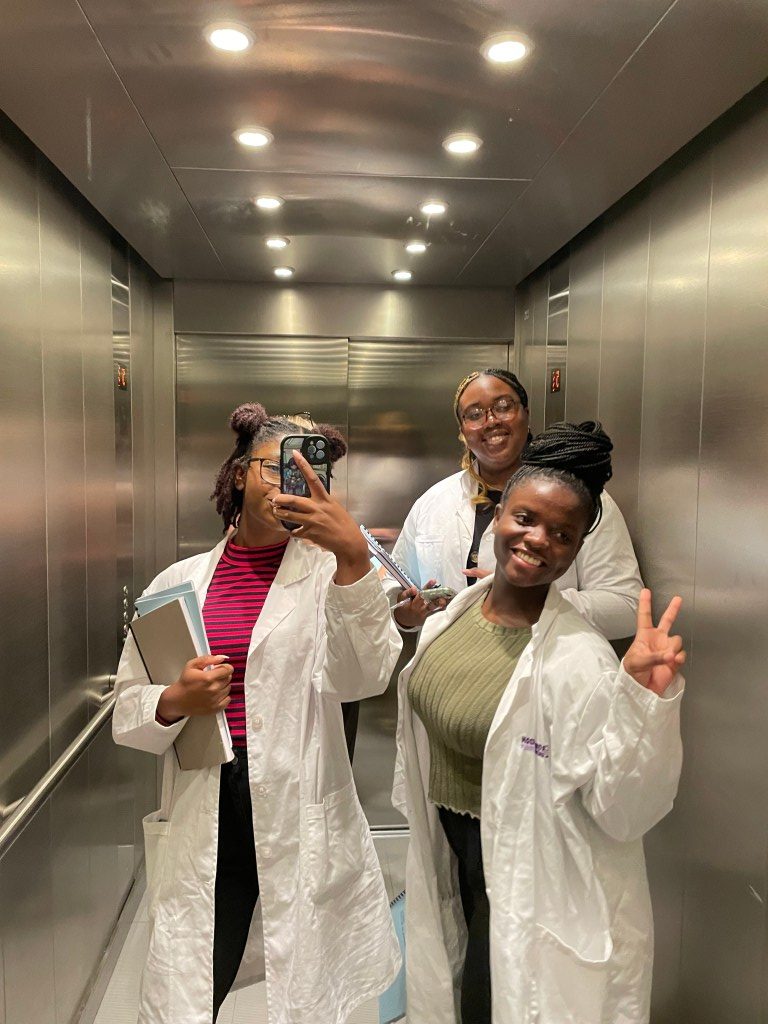
One of the highlights of the pharmacy programme is the simulation room. When I first learned about it, I loved the idea of getting hands-on-experience at the University. The idea of practicing in a simulated pharmacy environment – dispensing medications, counselling patients, and applying what we’d learned in class – made RGU stand out.
Another thing that got me excited about RGU was the emphasis on placements. The course dedicates significant time to hands-on learning, allowing students to apply their knowledge in real-world settings. And then there was a possibility of studying abroad which was a dream of mine that RGU helped make a reality.
My favourite moments on the course
Looking back on my pharmacy journey so far, one of my favourite experiences was being able to create a medication in the lab. As part of a second year-module, I worked with some students to create indomethacin tablets. It was such a rewarding experience as someone who wants to go into industrial pharmacy.
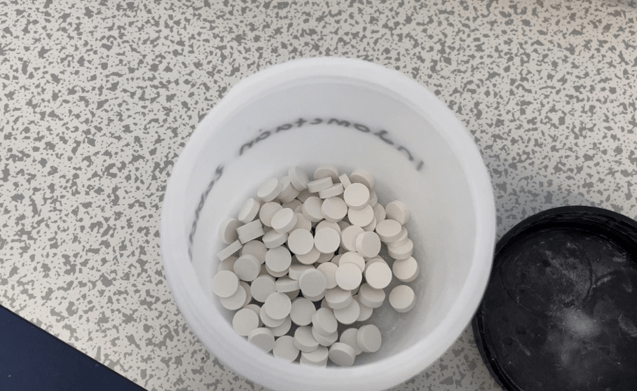
Beyond the academic moments, another joy of studying pharmacy is attending the pharmacy ball with your friends every year. It’s a fun experience and a wonderful way of celebrating the hard work we’ve put into our studies. It brings everyone from each year together to create wholesome memories.
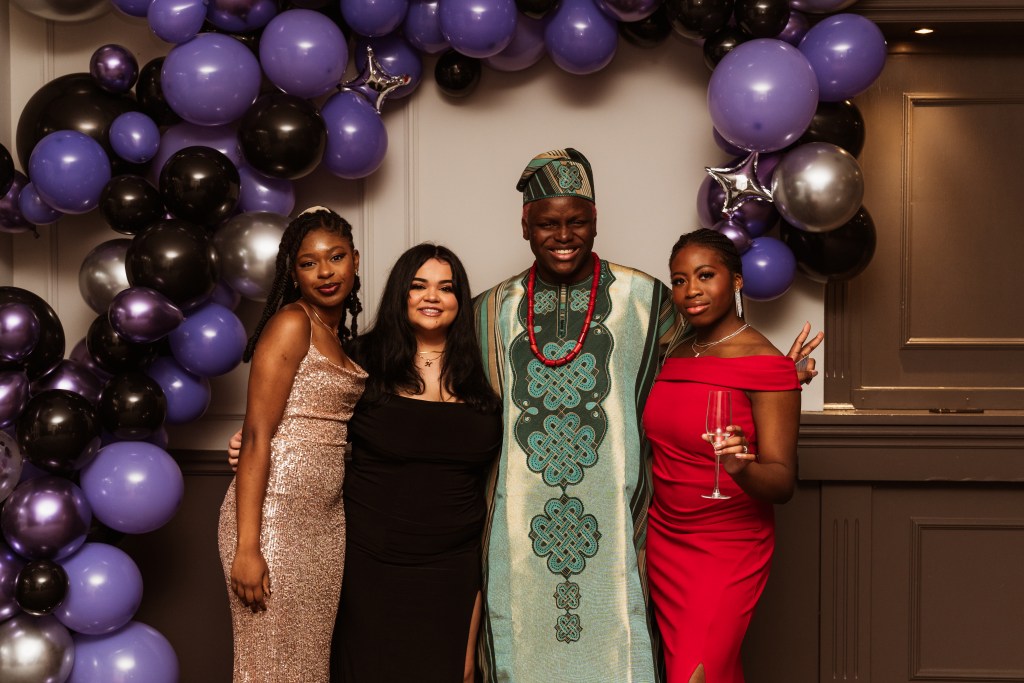
Volunteering abroad: my summer placement in Spain
Another rewarding part of my journey has been my summer volunteer placement in Spain. I reached out to RGU’s study office with the hope of being able to study in Spain, and they helped me arrange an incredible opportunity at the University of Granada. For two months, I volunteered in a hospital, working across multiple sectors and assisting PhD students with their research.
The experience was eye-opening. Pharmacy in Spain is very different from the UK system, and adapting to the new environment was challenging and rewarding. Although, I’m not fluent in Spanish, we managed to communicate using a mix of Spanish and English – “Spanglish”, as we called it! This language barrier pushed me out of my comfort zone and taught me the importance of adaptability and cultural competence in healthcare.
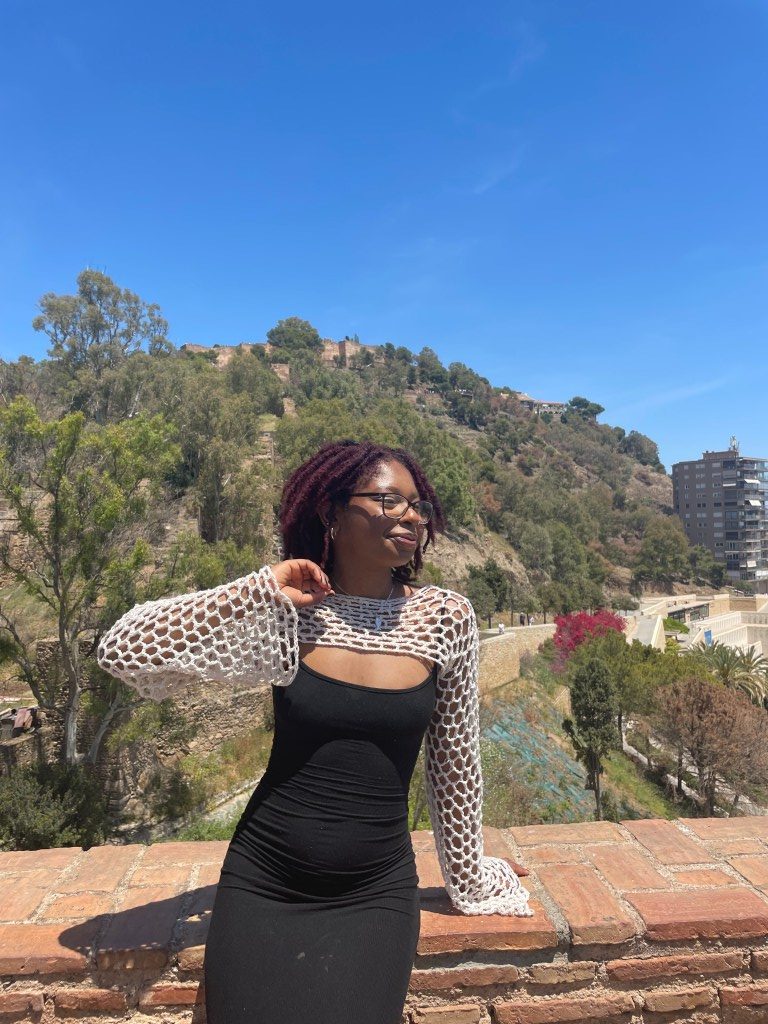
During my placement, I worked in areas like clinical trials, pharmacogenetics etc, gaining a deeper understanding of the diverse roles pharmacists play in healthcare. My favourite sector was pharmacogenetics, where we extracted DNA from patients’ saliva and analysed it for mutations that could impact their chemotherapy treatments. And as someone interested in oncology, this was something I enjoyed a lot.
How RGU has prepared me for the future
Studying at RGU has been an incredible experience. From the engaging lectures to the supportive teaching staff, I’ve felt constantly encouraged to grow and achieve my best. The staff at RGU go above and beyond to help students, whether it’s through academic support, career advice, or simply being there to answer questions. They’ve helped me navigate the many career paths in pharmacy, and through placements, I’ve gained a clearer understanding of the areas I’d like to explore further.
I’m particularly proud of my placement in Spain, not just because of the professional experience but also because it was a personal milestone. Moving to a new country where I didn’t know anyone – and where English wasn’t widely spoken – was intimidating at first. But it taught me resilience, adaptability, and the value of stepping outside of my comfort zone.
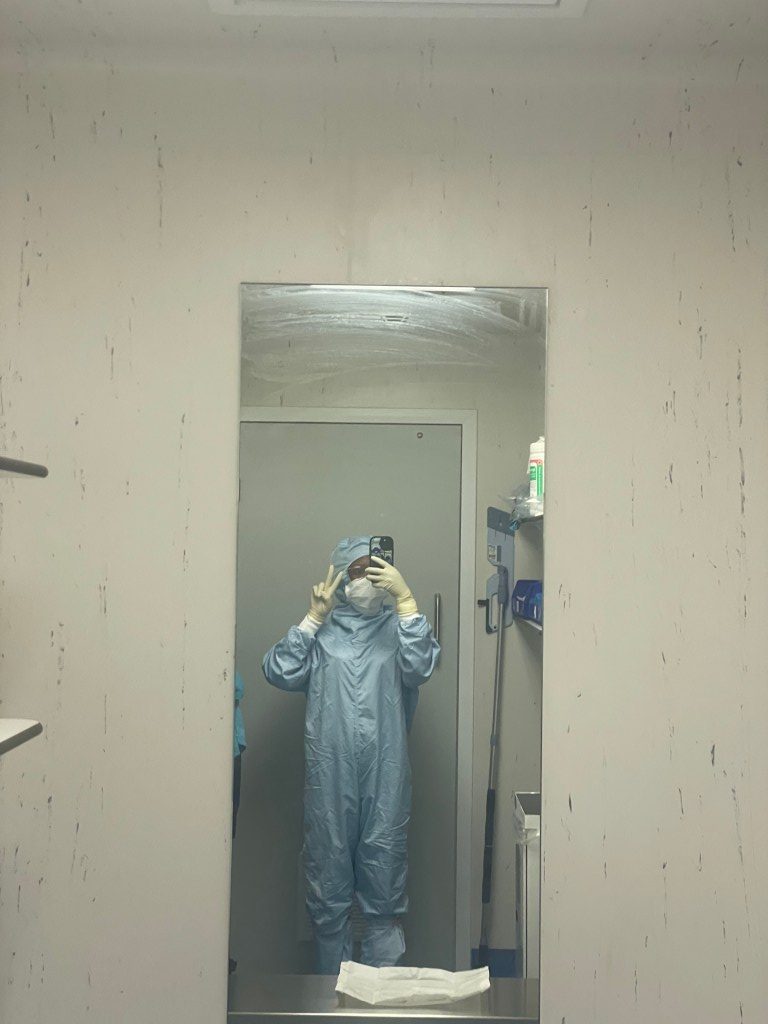
My advice to future pharmacy students
If you’re considering pharmacy or thinking about studying at RGU, my advice is simple: go for it. The course at RGU is designed to give you the skills, knowledge, and confidence you need to succeed in the field. Whether you’re interested in community pharmacy, hospital pharmacy, research, or something entirely different, RGU will equip you with the tools to succeed.
Looking ahead
As I reflect on my pharmacy journey so far, I’m incredibly grateful for the opportunities I’ve had. RGU has not only prepared me academically but has also given me the confidence to take on challenges and grow as a person. My experience in Spain enhanced my passion for the field.
Looking ahead, I’m excited to continue exploring different sectors of pharmacy. With the foundation I’ve built at RGU, I feel ready to make a positive impact in the field and to keep learning every step of the way.
Eva Ojediran
Related blogs
Grow personally and professionally with RGU’s Pharmacy Society
How I boost my employability as an international student
The post My Pharmacy journey so far at RGU appeared first on RGU Student Blog.
My experience studying the new MSc Healthcare Leadership at RGU
International student Kwame – and Head of a Health Centre in Ghana – shares why he decided to enrol in RGU’s new master’s in Healthcare Leadership, his experience studying on our campus, and the support he has received so far. A bit about me My […]
StudentInternational student Kwame – and Head of a Health Centre in Ghana – shares why he decided to enrol in RGU’s new master’s in Healthcare Leadership, his experience studying on our campus, and the support he has received so far.
A bit about me
My name is Kwame Tawiah Duah from Ghana, West Africa, and I am currently a student at Robert Gordon University (RGU), pursuing a degree in MSc Healthcare Leadership.
My professional background started as a nurse, with over ten years of experience as a registered general nurse in the clinical field, working closely with interdisciplinary teams to ensure the highest standard of care for patients. By embracing evidence-based practices, I have developed a deep understanding of patient care, emphasizing the importance of individuality and tailored treatment plans. This extensive clinical experience has provided me with a solid foundation and a holistic perspective on healthcare delivery.
In addition to my nursing experience, I hold a BSc in Physician Assistantship. This interdisciplinary knowledge base has broadened my understanding of healthcare delivery, fostered collaboration and promoted a comprehensive approach to patient care.
Currently, I fulfil the dual role of a Clinician and the Head of Health Centre within the Ghana Health Service. This position has provided me with hands-on experience in overseeing daily operations, coordinating resources, and ensuring quality healthcare delivery, which has shaped my passion for this course and led me to enrol in this program.
Choosing the new MSc Healthcare Leadership course at RGU
Choosing to study at RGU was an important decision for me. I was looking for a university that combined practical learning with academic excellence, and RGU stood tall due to its strong industry connections and reputation for employability. My passion for MSc Healthcare Leadership has grown over the years, and I wanted to refine my skills, gain hands-on experience, and network with professionals in the field. The course structure, faculty expertise, and the university’s emphasis on real-world applications made it an ideal choice. I was eager to engage in rigorous academic coursework that delves into the intricacies of healthcare systems, quality improvement, and strategic decision-making. I aim to augment my existing knowledge and skills, further develop my expertise in healthcare management and policy.
Studying at RGU as an international student
Studying as an international student is quite daunting but at RGU, it has been an enriching experience. The MSc Healthcare Leadership course is well-structured and delves into the intricacies of healthcare systems with a balance of theoretical knowledge and practical applications.
The programme comprises nine module study areas made up of five elective modules and four core modules in health and social care. One of my favourite aspects has been the interactive lectures and hands-on projects in class that allow students to apply what they learn in real-world scenarios in group discussions and presentations which strengthens diversity and inclusion.
It is interesting to add that, using the collaborative approach in teaching and learning, experts in healthcare leadership and social care are quite often invited to share practical knowledge and hands-on experience with students in some of the lecture sessions. The lecturers are so profound in knowledge, approachable, and always willing to provide guidance.
One highlight of my journey so far has been utilising the study skills centre. For example, working on course assessments or assignments helped me develop critical academic writing skills such as critical appraisal, analysis and evaluation of theories in subject areas which have sharpened my critical thinking and problem-solving skills. Additionally, the opportunity to collaborate with fellow students from diverse backgrounds has broadened my perspective and enhanced my teamwork abilities.
Receiving support at RGU
RGU offers incredible support systems for students, which I have personally benefited from. The University provides academic support through tutors, the Study Skills and Library support teams, career guidance services, as well as social well-being and well-equipped study spaces. Additionally, the student support services, including mental health resources and career counselling, have been invaluable.
Some specific support services I found helpful that I accessed were career or job fairs, library support and study skills support, such as the referencing and academic writing workshops both via Microsoft Teams and in-person sessions. This has helped me stay on track with my studies and manage the challenges of university life effectively.
Again, one fascinating support system for students which is helpful and can never be underestimated is the food bank on campus and especially the weekly breakfast and lunch which is open and free to all students who are in need.
My aspirations for the future
My journey at RGU has been fulfilling, and I am grateful for the experiences and support system that have come my way. From engaging in rigorous coursework to supportive faculty and a vibrant student community, RGU has exceeded my expectations. I look forward to making the most of my remaining time here and applying my knowledge to future endeavours.
Ultimately, my aspiration is to assume a leadership role in my institution or any renowned health and social care organisation where I can make a meaningful impact on healthcare delivery, addressing systemic challenges and improving patient outcomes. With my strong clinical background, managerial experience, and dedication to continuous learning, I believe that pursuing a master’s degree in healthcare leadership at RGU will provide me with the necessary tools and knowledge to achieve this goal. I am particularly interested in managing change and health policy and hope to contribute meaningfully to this space.
If you are considering studying at RGU, I highly recommend it. The University provides a nurturing environment where students can thrive academically and professionally. I am excited about what the future holds and I am confident that my time at RGU will play a crucial role in shaping my career.
Kwame Tawiah Duah
Related blogs
My journey of personal growth studying Radiography at RGU
My experience studying a postgraduate course in Physiotherapy
The post My experience studying the new MSc Healthcare Leadership at RGU appeared first on RGU Student Blog.
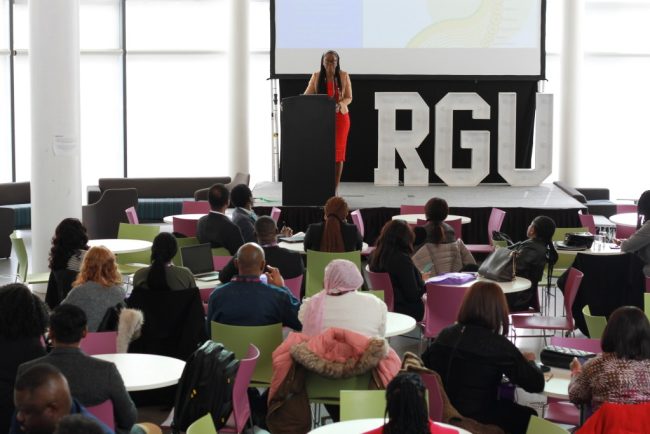
Highlights from the School of Law and Social Sciences International Research Conference
The newly merged School of Law and Social Sciences at Robert Gordon University hosted its first international research conference on Thursday 27 and Friday 28 February. The conference, themed “Law as a Catalyst of Social Development,” brought together researchers, industry professionals, and policymakers from around […]
StudentThe newly merged School of Law and Social Sciences at Robert Gordon University hosted its first international research conference on Thursday 27 and Friday 28 February. The conference, themed “Law as a Catalyst of Social Development,” brought together researchers, industry professionals, and policymakers from around the world to engage in interdisciplinary dialogue and knowledge exchange.
Research student Kamo Sende shares some highlights from the conference in this blog.
A Global Platform for Interdisciplinary Research
The inaugural conference proved to be a remarkable success, attracting approximately 130 participants from 15 countries across four continents. Researchers presented their work through both in-person and virtual participation formats, ensuring global accessibility and engagement. The event featured over 40 presentations, delivered as academic papers and poster presentations across five thematic panels, each aligned with the University’s core research areas: Environment and Sustainability, Creative and Inclusive Societies, Health and Wellbeing, Digital Communities, and Pedagogy.
The conference’s guiding philosophy recognised that law does not exist in isolation but serves as a catalyst for social development. As emphasised throughout the event, until legal frameworks are reimagined to serve our shared planet, their utility remains abstract. This perspective formed the foundation of the interdisciplinary approach that characterised the conference.
The conference was organised through collaborative efforts, with myself, Kamo Sende, a Doctoral Researcher at the School of Law and Social Sciences, having the privilege to serve as Chair of the Conference Planning Committee, working alongside talented colleagues.
The Committee comprised a dedicated team of doctoral researchers including Palika Vithana (Head of Content and Co-lead Marketing), Katarina Tasic Dittrich (Head of Programmes), Simi Shoda (Head of Events), Jenny Thompson (Head of Marketing), Nelly Kiragu (Head of Finance and Co-chair), as well as committee members Francis Mbanefo, Joanna Santos Petiot, Hannah Johnstone, Idasemiebi Idaminabo, Blessing Bulaun, and Blessing Abeji.
Student Union President Seth Odei also provided valuable support, alongside conference volunteers Hayford Mensah, Hayford Appiah, and Sarah Bradshaw. Dr Uche Iloka, Research Degrees Coordinator at the School of Law and Social Sciences, served as the conference convener, together with co-convener Dr Judith Oloo.
The planning team also benefited from the guidance of Dr Sarah Sivers (Associate Dean Research), Dr Joseph Mante (Principal Lecturer Research), and Dr Katrina Forbes-McKay (Research Degrees Coordinator), all from the School of Law and Social Sciences. This doctoral student-led initiative provided a unique platform where diverse perspectives could interact and inform each other. Interested readers can explore the rich diversity of research topics and speaker profiles in the conference programme.
Distinguished Insights and Thematic Explorations
The conference featured three distinguished keynote speakers who brought diverse perspectives to the discussion. Michael Watson, Head of Climate Advisory at Pinsent Masons, delivered the opening keynote, setting the tone for discussions around environmental sustainability and legal frameworks that can drive positive climate action. Dr Adaeze Afezulike MBE, Regional Director of the British Society of Lifestyle Medicine and a practising lifestyle medicine physician, addressed the critical intersection of health, wellbeing, and legal structures in her keynote presentation.
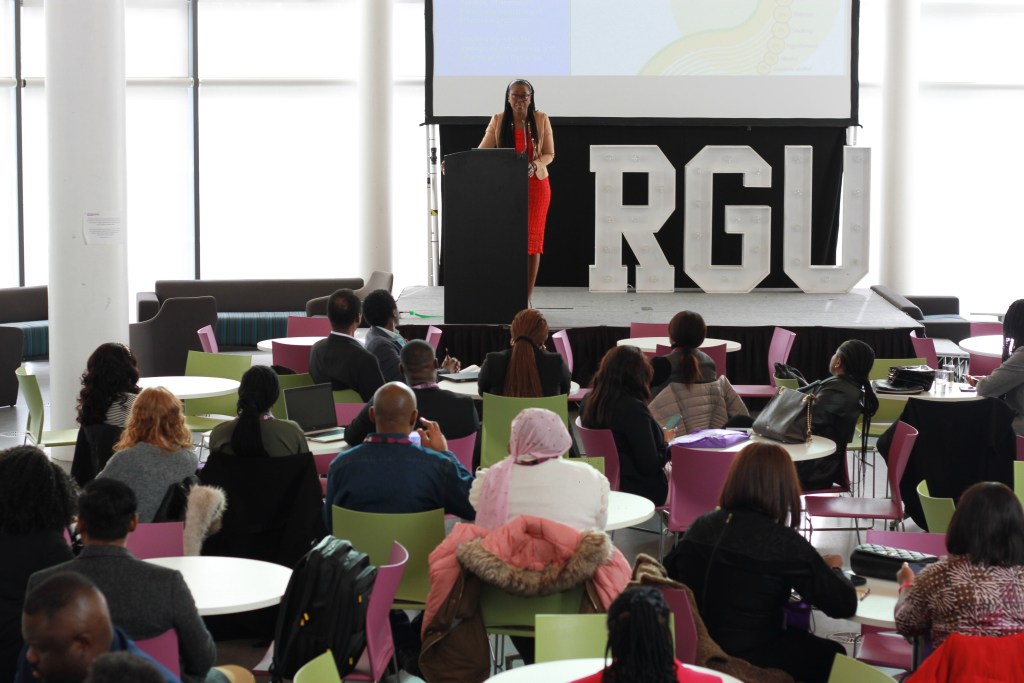
On the second day, The Rt Honourable Stephen Flynn, SNP Group Leader in Westminster and Aberdeen’s Member of Parliament, delivered a keynote that thoughtfully connected parliamentary work with research applications, highlighting the vital relationship between academic inquiry and policy development. At the conference dinner hosted at the Sandman Hotel, John Clifford, Dean of the School of Law and Social Sciences, presented a keynote examining whether law operates proactively or reactively in social development. His presentation analysed two areas from Delict/Tort Law: Liability and Negligent Driving, and the Doctrine of Vicarious Liability and Demarcating Responsibility, considering both historical and contemporary developments in these fields.
Each panel session delved into one of the University’s core research themes, generating valuable insights and identifying areas requiring further investigation. Rapporteurs from each panel presented summaries focused on three key areas: most striking findings, most significant impacts, and areas needing deeper investigation. Several recurrent themes emerged across presentations, with particular emphasis on interdisciplinary collaboration in academia, collaboration with industry partners, and collaboration with policymakers.
Presentations in the Environment and Sustainability theme highlighted research on the necessity for climate action by all nations. Discussions emphasised the need for legal frameworks that facilitate sustainable practices and environmental protection across sectors. Research presented in the Creative and Inclusive Societies theme revealed staggering statistics about water usage in Europe, suggesting the importance of legal structures that foster resource conservation and social equity. The Digital Communities and Pedagogy theme examined issues around data usage and rights in Europe and around the world, exploring both opportunities and challenges in creating equitable, accessible digital communities.
The Health and Wellbeing theme explored the intersection of legal frameworks and public health, with particular attention to how legislation can promote positive lifestyle choices and support community wellbeing. Research presented in the Creative and Inclusive Societies theme also examined issues including electoral violence in developing countries, suggesting the importance of legal structures that foster democratic stability and social inclusion.
Policy Impact and Future Directions
A distinctive feature of the conference was its emphasis on practical application and policy relevance. The second day featured a roundtable discussion that brought researchers into direct conversation with policymakers and industry representatives. This session, anchored by David Christie (Associate Dean for Academic Development and Student Experience) and Dr Natascha Mueller-Hirth (Associate Dean for Economic, Social and Cultural aspects), created a valuable forum for exploring how research can effectively inform policy development.
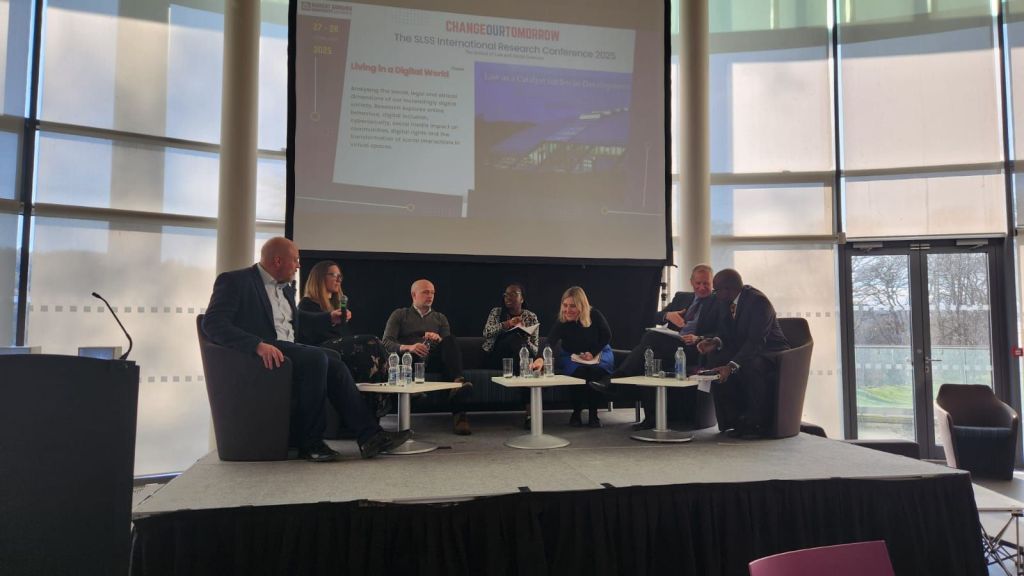
Participants in this policy roundtable included Caroline Hood, Executive Team Member at Nestrans, representing the transport industry; Dr Alistair Baker, College Principal at ICRGU, representing the education sector; Dr Mark Osa Igiehon, CEO of Aberdeen Commercial Consulting, Lecturer at the University of Aberdeen, and a Clergy; Hon Mariah Ichakpa, Member of the Scottish Youth Parliament representing Aberdeen Central; and The Rt Hon Stephen Flynn, Leader of the SNP and Member of Parliament for Aberdeen South. The discussion highlighted pathways for strengthening collaboration between academia, industry, and government to drive evidence-based policy reforms.
The conference also showcased industry innovation, with Roger Connon, Head of Energy for Vario at Pinsent Masons, introducing attendees to innovative legal approaches being developed in the energy sector. The conference culminated in a call to action that emerged from the collective insights of all panel sessions, emphasising the need to enhance interdisciplinary collaboration within academia, strengthen partnerships with industry, and advocate for legal reforms through government partnerships. These directives recognise that effective social development requires cooperation across sectors, with law serving as a connecting framework that can either enable or constrain progress.
Beyond the formal presentations and discussions, the conference created valuable opportunities for networking and community building. The conference dinner at the Sandman Hotel provided participants with a chance to engage in informal conversations, develop professional connections, and explore potential collaborations. This social dimension of the conference complemented its academic focus, recognising that relationship-building is an essential component of effective interdisciplinary work.
As the first international research conference of the unified School of Law and Social Sciences, SLSS2025 has established a strong foundation for future scholarly exchange. By bringing together diverse perspectives around the theme of “Law as a Catalyst of Social Development,” the conference has initiated important conversations that will continue to evolve in the coming years. The interdisciplinary approach modelled during the conference reflects a recognition that today’s most pressing social challenges cannot be addressed through siloed thinking. Instead, they require collaborative approaches that draw on diverse forms of expertise and experience.
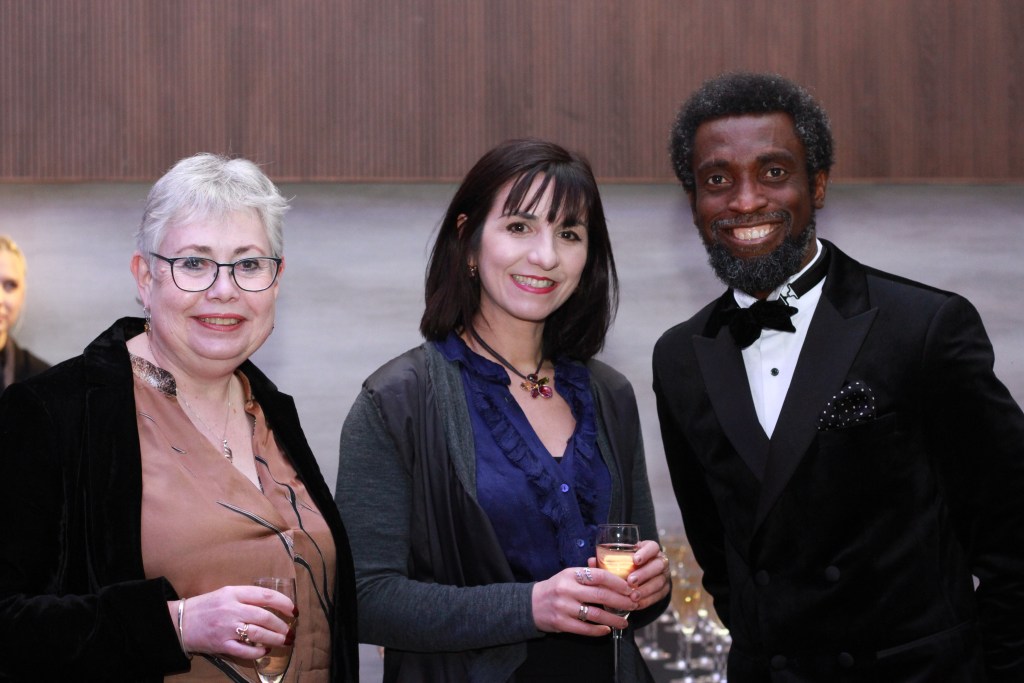
As RGU continues to develop its research profile across its five core themes, the insights generated during this conference will undoubtedly inform and inspire future work. This sentiment was eloquently expressed by Professor Nick Fyfe (VP Research) in his opening remarks and reinforced by Professor Sarah Pedersen (Dean, Graduate School) during the ceremony. The connections established between researchers, industry professionals, and policymakers create pathways for impact that extend far beyond the conference itself. The inaugural SLSS International Research Conference has demonstrated the power of bringing together diverse perspectives around a shared commitment to understanding how law can better serve as a catalyst for positive social development. As we look to the future, the conversations begun during this conference will continue to evolve, contributing to both scholarly understanding and practical application in ways that benefit our shared society.
Kamo Sende
Related blogs
My academic expedition to Geneva and The Hague with RGU Law
Starting a career in Law as a recent RGU graduate
The post Highlights from the School of Law and Social Sciences International Research Conference appeared first on RGU Student Blog.
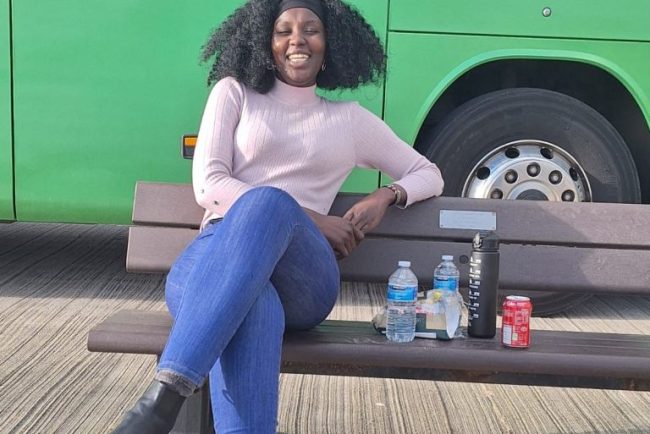
Moving from Kenya to study at RGU in Aberdeen
Esther shares her journey from Kenya to RGU, obtaining a scholarship, and her experience settling in Aberdeen after enrolling on the MSc Business Innovation and Entrepreneurship. Choosing RGU My journey to the UK started in late 2022 when I wanted to upgrade my education. My business was […]
StudentEsther shares her journey from Kenya to RGU, obtaining a scholarship, and her experience settling in Aberdeen after enrolling on the MSc Business Innovation and Entrepreneurship.
Choosing RGU
My journey to the UK started in late 2022 when I wanted to upgrade my education. My business was experiencing post-Covid losses and I saw the need to get the right knowledge and skills to get me through it.
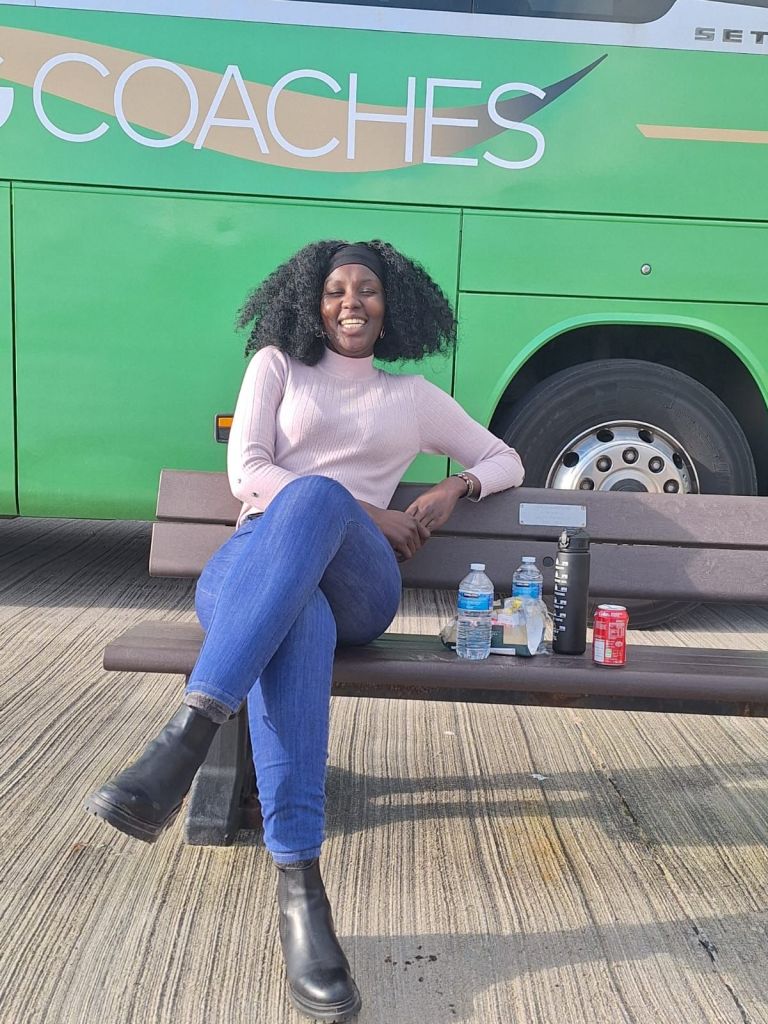
I applied to universities in England and got a few offers. I chose one and paid the deposit to get my CAS with the university. Unfortunately, the embassy took time to respond so my CAS was withdrawn and my visa denied in October 2023.
I was heartbroken to lose my visa fee and my chance to study abroad. However, I don’t give up easily, so I decided to give it another chance. I was going through RGU’s website when I stumbled upon some of their accolades. This gave way to researching more about RGU and deciding to give it a shot.
Finally, I was accepted for MSc Business Innovation and Entrepreneurship. The course modules were a perfect match for my needs career and business-wise.
The Dean Scholarship
Through out my application journey, I learned about different scholarships that were available to me. Some of those included Chevening and Commonwealth, which are available for most UK universities. I had previously applied but I wasn’t successful.
I decided to try scholarships that were available at RGU specifically. The main requirement for the Dean scholarship was writing a couple of essays. I decided to tell my story as raw and unedited as it was, and was fortunate to be among the two awardees of the scholarship!
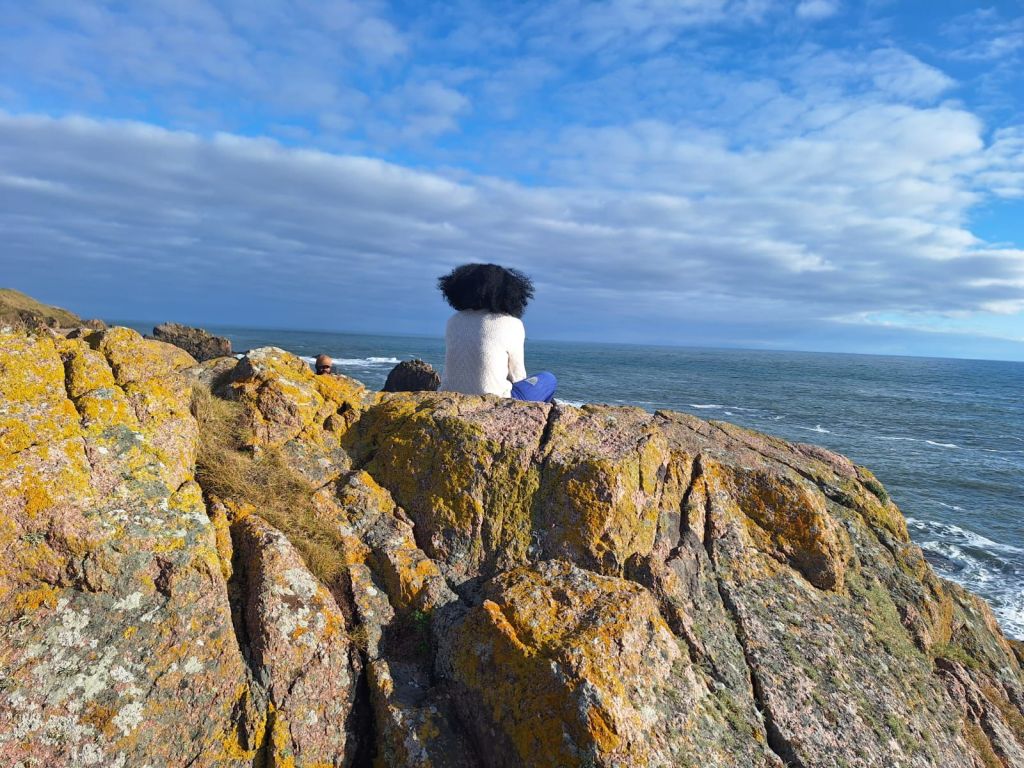
Relocating to Aberdeen
The internet makes the world a global village and social media is a very powerful tool for information. I mostly used Facebook to connect with other Kenyans who were living in Aberdeen.
I wasn’t lucky enough to get a long term accommodation prior to my relocation but I booked a hotel near the train station for a few days before I could secure one. Little did I know that temporary and long term accommodation information was available for students, which would make the process less stressful. Through the various Kenyans I interacted with, I was able to gain knowledge about the various accommodation options like RGU student accommodation and private sites like Spareroom, Gumtree, and On the market property among others. Another concern was getting African food stores, but I was shocked to learn that I would easily find them.
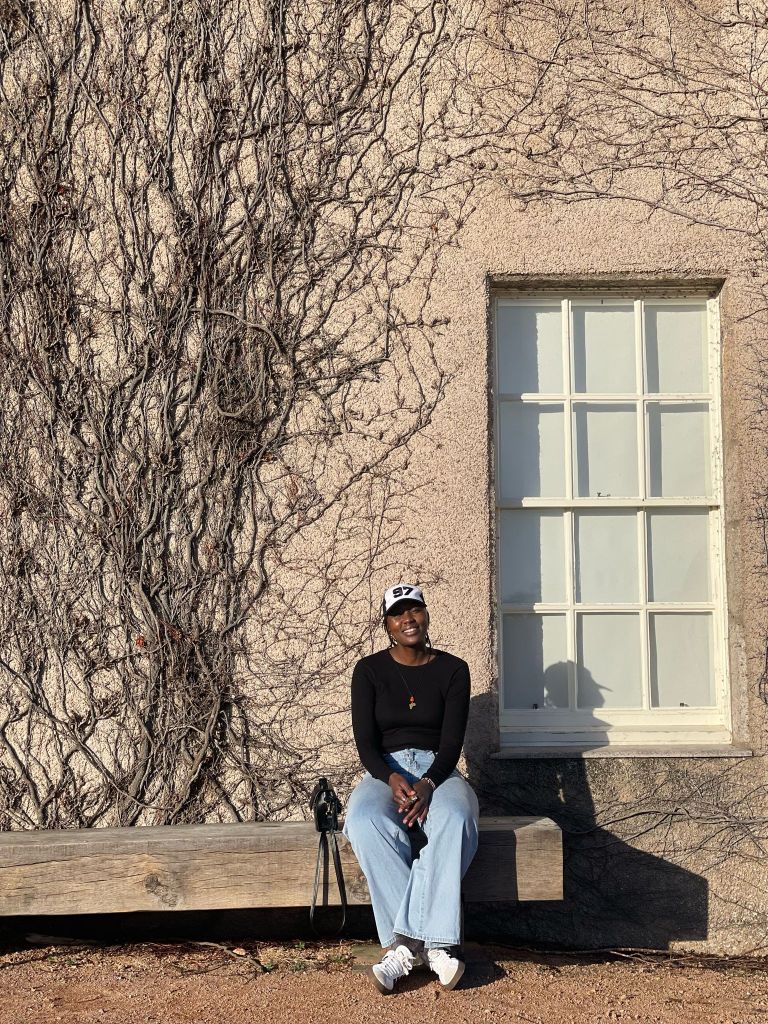
Experiences and challenges as an international student
As an international student, leaving your home country and packing your whole life in about two suitcases to study has its fair share of challenges. Some of the few challenges I initially encountered were coping with winter, understanding the Scottish accent, embracing different cultures and different languages from different international students.
My experience so far one year down the line has been amazing. I have experienced the beauty of the Aberdeen countryside and the beaches most of the weekends. I have made friends from different countries as well as learned a couple of greetings in different languages.
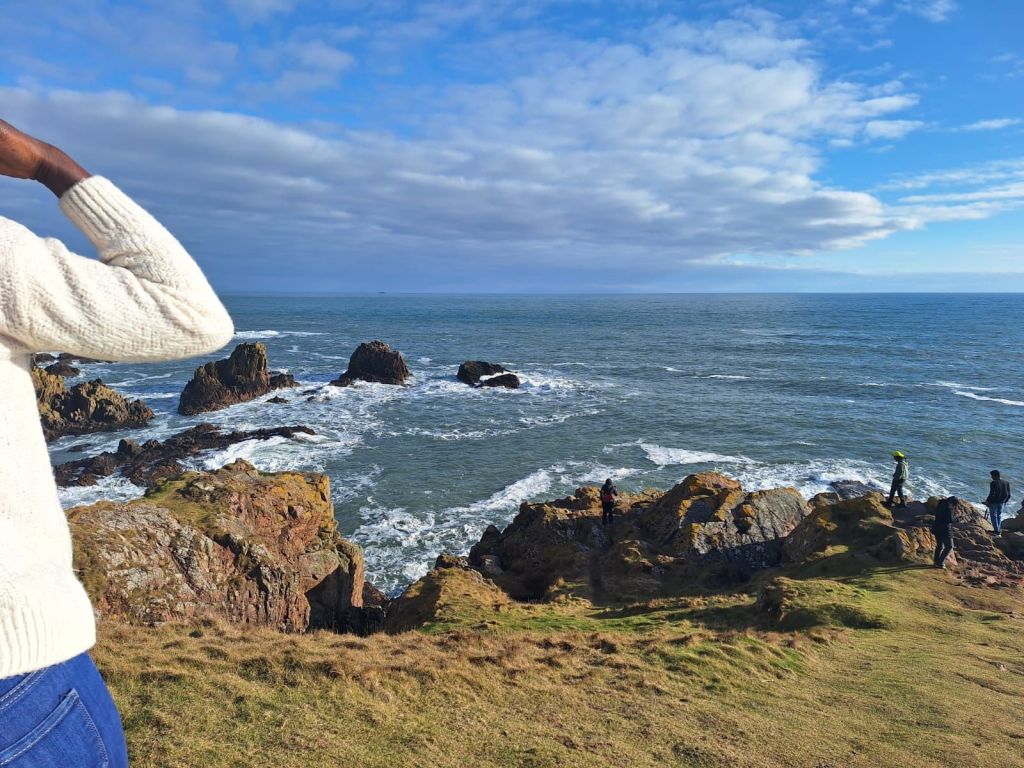
My advice to prospective students
The application process is not complicated, and you need not do it alone. There are educational agencies in different countries which are approved by RGU to assist you with the process. The visa process is what most students fear the most, but once you have all your documents in check you are good to go. RGU’s website offers more than enough information on the whole process.
Relocating may seem like a nightmare but coping will come with time. You need an open mind and be willing to learn and appreciate diversity. Aberdeen is a cold place, but its not always cold throughout the year. It has amazing scenery, and with your weekly bus ticket you can use the chance to visit different places over the weekends.
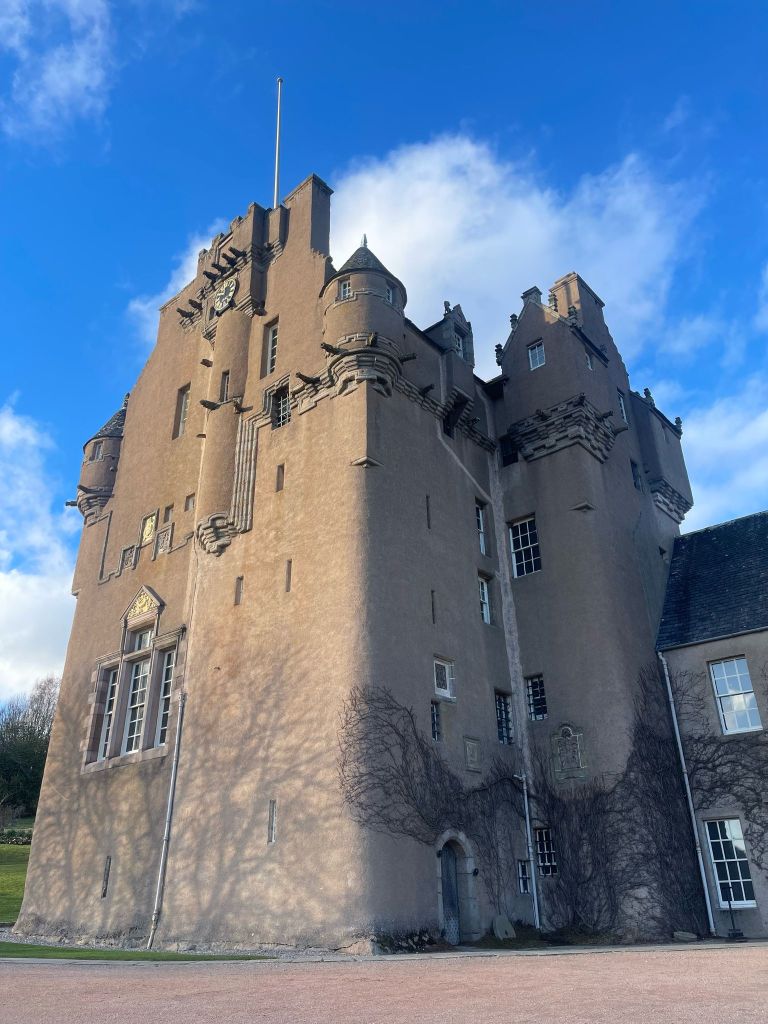
Esther Karanja
Related blogs
From recruiting students in India to becoming one at RGU
My journey from Canada to Aberdeen and RGU
The post Moving from Kenya to study at RGU in Aberdeen appeared first on RGU Student Blog.
Studying the online Business Management course at RGU
RGU student Gail shares her career journey living across different countries and her decision to go to university years later to study the online Business Management course to fit around her busy life. A bit about me and my career My journey back to education […]
StudentRGU student Gail shares her career journey living across different countries and her decision to go to university years later to study the online Business Management course to fit around her busy life.
A bit about me and my career
My journey back to education has been a long and convoluted one. Towards the end of high school, I applied to university as that was the “done thing”, but I ultimately decided that higher education was not the right path for me. At that stage, I thought that I would never pursue further formal education.
My career since leaving school has seen me grow exponentially, personally as well as professionally. It hasn’t always been linear – I never thought I would learn much working on a cattle station in Australia or in a factory in New Zealand, but these are some of the experiences that I look back on and can see how much I grew.
This growth was really kickstarted when I found the tourism industry. I started out as a cleaner in a hostel in Brisbane and from there progressed to a supervisor role, and then on to managing a hostel. After a while, I found myself taking a step back from the customer facing side of tourism and I am now an Organisational Development Manager for a leading online travel agent.
Deciding to go to university
I have learned a lot through life experience and on the job training, however, over the course of a few years, I began to realise how beneficial formal learning may be to my career development. Especially exposing me to aspects of business that I may not yet have experience in and may not get the chance to in my current role.
After doing a LOT of research, I found the Business Management online course at RGU and it was like a light switched on. A course that I could fit around work as well as life sounded almost too good to be true.
My experience studying the Business Management online course
I’m not going to lie, heading back to school as a *ahem* mature student, was daunting and I definitely doubted myself. But the team at the Aberdeen Business School alleviated those fears from the very beginning.
The course has been inclusive, informative and I have really enjoyed learning from the team. The discussions within the class push people out of their comfort zones just enough to really get the best out of them. The flexibility of online learning has meant that I can watch lectures in my own time and at my own pace and with a busy life, this has been key to my enjoyment of this course so far.
I always like to challenge myself and I have found that this course has been the perfect thing for my life right now. Coming to this with work and life experience has added a layer of depth to my learning that I don’t think I would have had, had I gone to higher education back when I was 18.
Doing this course has made me realise that it’s never too late to invest in yourself and that is something I will carry with me for a long time.
Gail MacSween
Related blogs
Studying Business Management online after 25 years of work
Studying an MBA online at RGU while working full-time
The post Studying the online Business Management course at RGU appeared first on RGU Student Blog.
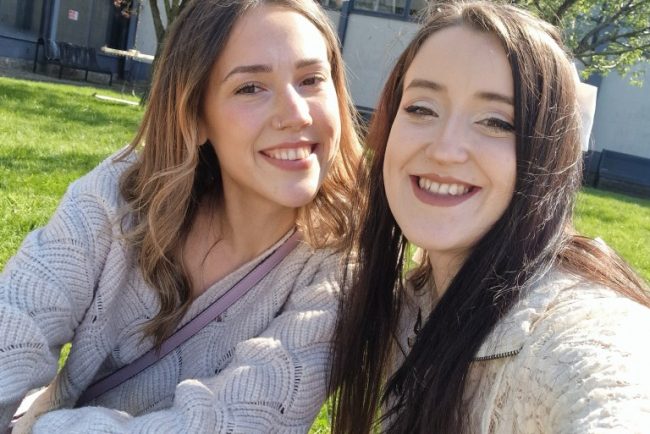
From Undergraduate to Postgraduate studies at Gray’s
Fine Art student Kirsty shares her journey from studying an undergraduate degree in Painting at Gray’s School of Art, RGU, to staying for a master’s to develop her research and practice further. Starting my art journey at RGU When choosing what university to study at, […]
StudentFine Art student Kirsty shares her journey from studying an undergraduate degree in Painting at Gray’s School of Art, RGU, to staying for a master’s to develop her research and practice further.
Starting my art journey at RGU
When choosing what university to study at, I had a bit of a hard time making the decision, mainly because it was during COVID-19 which meant that I couldn’t visit the University for its open days. Still, I was able to visit Aberdeen and something about the campus and university was a big draw for me without having entered the buildings. It felt like Aberdeen had a comfortable balance between being a city and having places to go that felt quieter and more relaxed. I grew up in a small town and spent a lot of time in rural areas so I liked having the mix.
Once I had decided to move to Aberdeen and study at Gray’s School of Art, I couldn’t have been happier with my decision. I had so many worries about what studying art would really be like, whether I would receive harsh criticism, would my work be ‘good enough’, would I fit in? I had a lot of doubts but in reality, it could not have been further from that.
Whilst we [students] do have feedback and ‘crits’ with staff and peers, it has always been very constructive and given in a way that helps us improve and work towards a vision. It has also opened my eyes to much bigger and broader ideas that I hadn’t even considered, and my work began to change immensely for what I believe is the better. My research became something I really enjoyed and it began to drive my work, which was not necessarily the case before as I always struggled with reading, but once I found the texts and research topic that interested me, it became easier.
My experience on the Painting course
The painting lecturers were phenomenal at providing support. Helping me sort out the formalities in my work and honing me in on making my exhibitions make more sense has been very helpful and ultimately is what guided me towards such a successful degree show with two awards (RSA New Contemporaries & RGU Art and Heritage Collection).
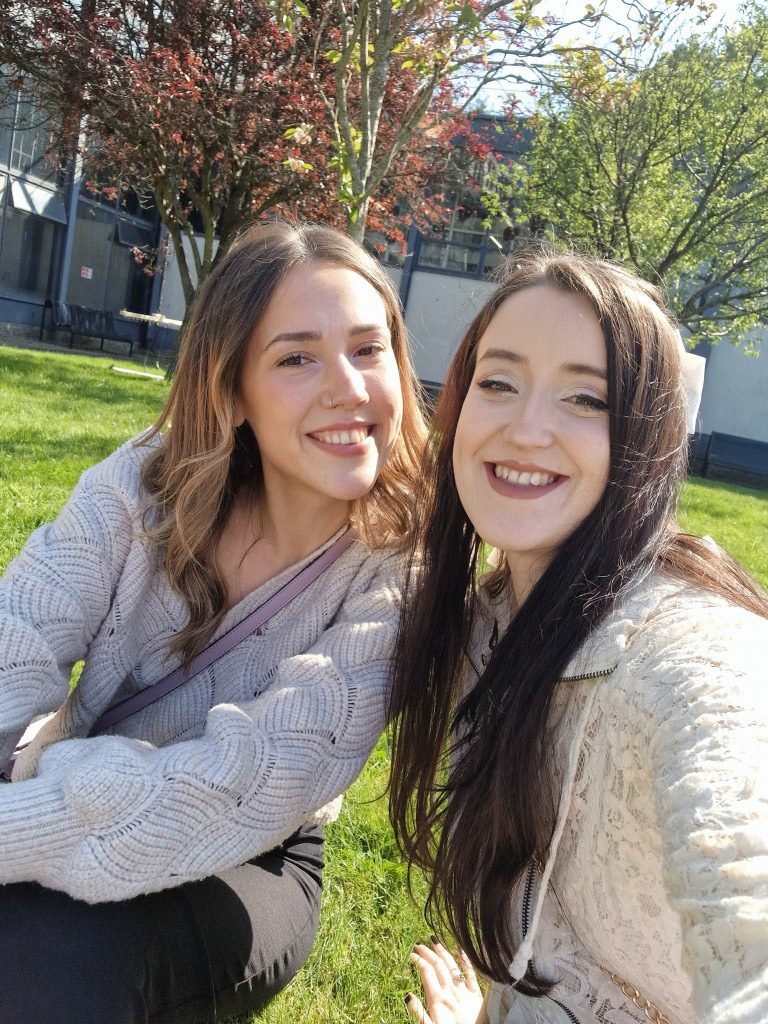
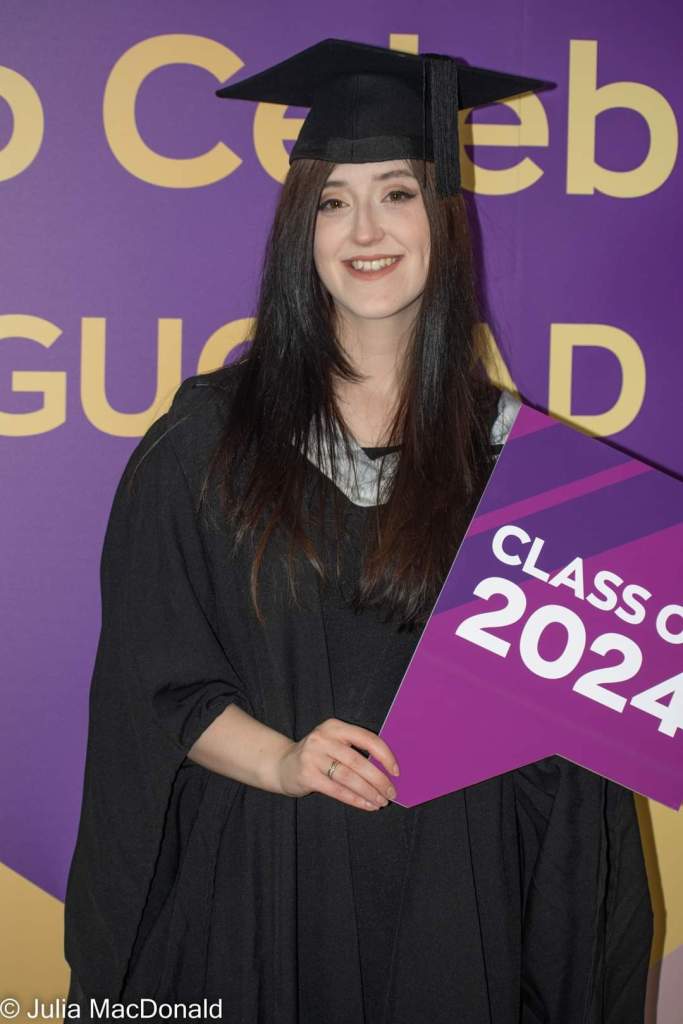
I gained a lot of confidence through being able to speak in depth about my work and that is why I also took a chance in my final year of undergraduate to apply to various awards, residencies and opportunities alongside the ones that are arranged by Gray’s. I didn’t necessarily think I would win any, but I had the confidence to at least apply and try. With that, I managed to get an award with Queen Elizabeth Scholarship Trust (QEST). This has allowed me to undertake two courses learning how to make natural pigments, inks, dyes, natural tools and so on, which I am now doing alongside my master’s programme (many of these opportunities were sign posted by lecturers on our Moodle).
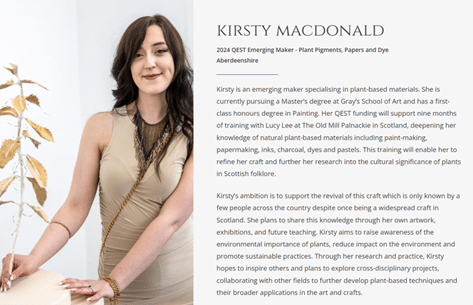
Choosing to come back to Gray’s to study a master’s in Fine Art
So, what I am trying to say is that my undergraduate studies really put me in good stead for going on to do a postgraduate course. One of the things that really led me in the direction of the master’s in Fine Art is, that during my undergraduate course, I discovered a great interest in my area of study into Scottish culture and plants.
I felt that, while I was really happy with my dissertation in 4th year, there was also so much more information and research I did that could not fit, and I wanted to continue my research with the support of an institution like Gray’s where I have access to tutors’ advice. Also, I thought there was so much more to explore within my creative practice as well – hence applying for the QEST funding.
I knew there was so much more to learn and I wanted to have an environment where I could continue to do that.
Differences between undergraduate and postgraduate studies at Gray’s
The biggest difference I have noticed is that the undergraduate course really focused on finding your area of interest. There was a focus on experimenting with various ideas with a wide array of possibilities for where your work can go, and then having those one-to-one chats with your personal tutor to help see what, out of everything you are learning, actually interests you as an individual as well as giving us advice for how we can better curate our work and connect everything together.
A focus on research and practice in the master’s
The classes focused on ‘studio’ and those focused on ‘critical and contextual studies’ (CCS) were also somewhat disparate in the undergraduate. You didn’t necessarily need to connect your CCS research to the work that you were creating in the studio, though some people did, not everyone chose to. What I have noticed most from the postgraduate course is that CCS and studio have become much more linked.
The master’s continues to introduce us to more research areas and topics with somewhat more challenging texts to read, and there is a good level of independent study whilst still having quite a lot of student-tutor contact. Because I have that background of having done my undergraduate, I am confident in what I am currently doing in the master’s, which allows me to work more independently.
I know what area of study I am interested in at this point, and what I am learning from the master’s is expanding upon the research I did in the undergraduate, and developing upon my studio practice as well. The undergraduate got me to a stage where I finally found out what I wanted to do with my art and it was really just the beginning of my more refined art practice that I am delving deeper into now.
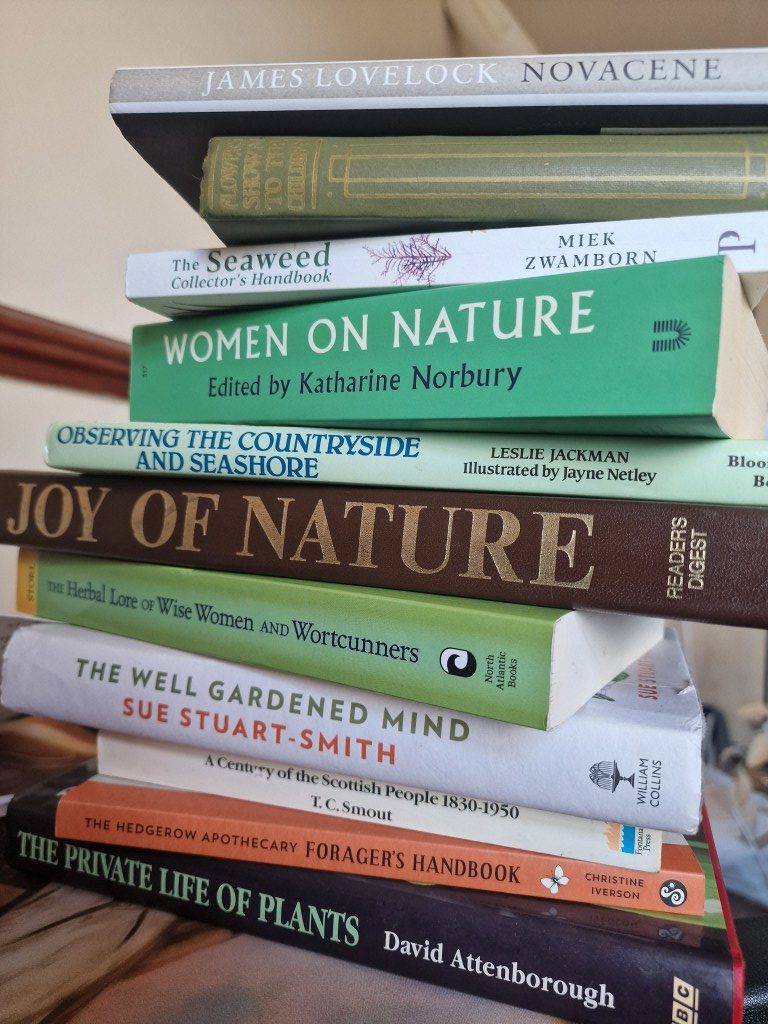
Because I have such a strong interest in my research area, I have even considered going on to do a PhD in the topic area of Scottish Culture and plant connections with a dream of one day writing a book. This is something I never would have considered doing in the past but with the support of lecturers and fellow students too, I feel like it is an opportunity that would be really interesting and exciting as it would allow me the time to create something in a supported environment, which would be much harder to do on my own out with the University.
A quieter environment
The classes are smaller in the postgraduate course, with a much quieter environment than what you have at undergraduate level. The positive side of this is getting to know a wide range of new people from different backgrounds. This includes people who perhaps graduated the same year as you, but from a different department within the school, graduated years ago, or in some cases are new to the scene of study but have been a practising artist for many years.
In your postgraduate course, all the different disciplines come together, CAP, Painting, Ceramics, Sculpture, Fashion, Digital, so it gives such a different perspective. The variety of skills and backgrounds is exciting with the smaller class numbers too as we all get to know each other well and become quite a close little cohort.
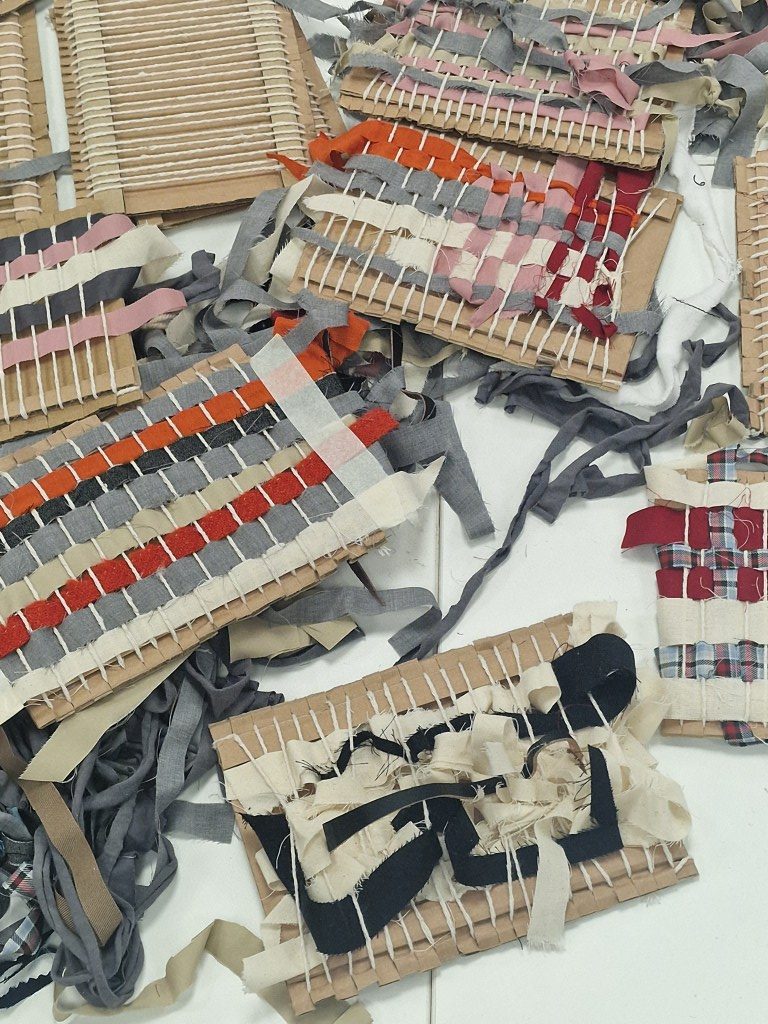
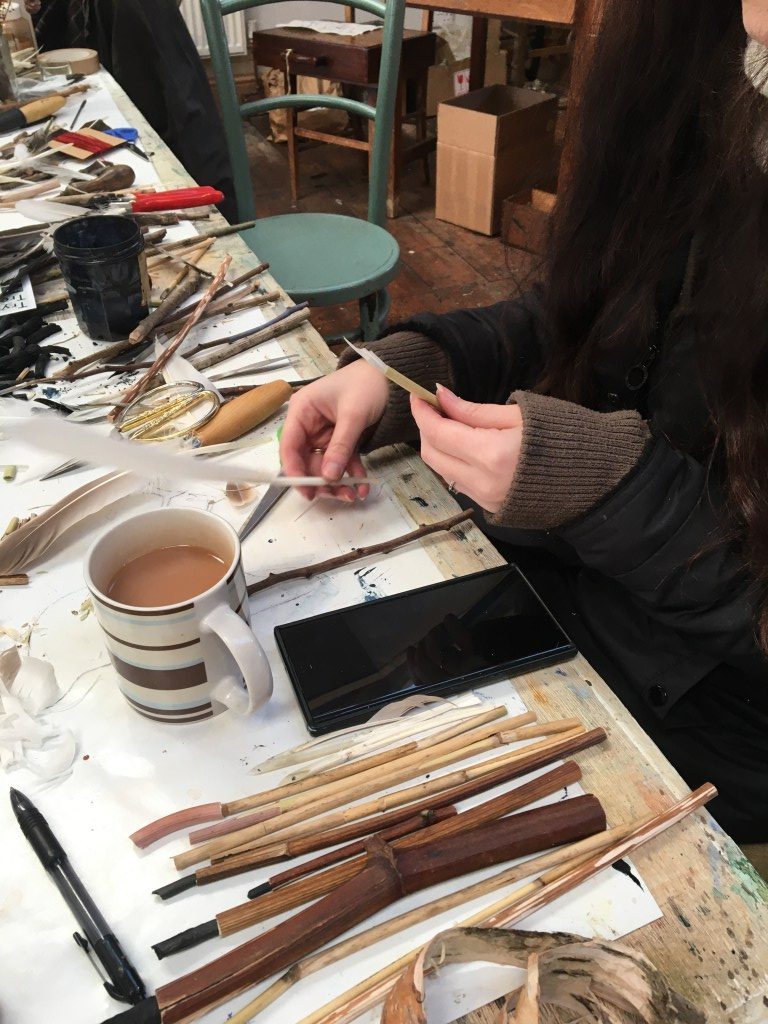
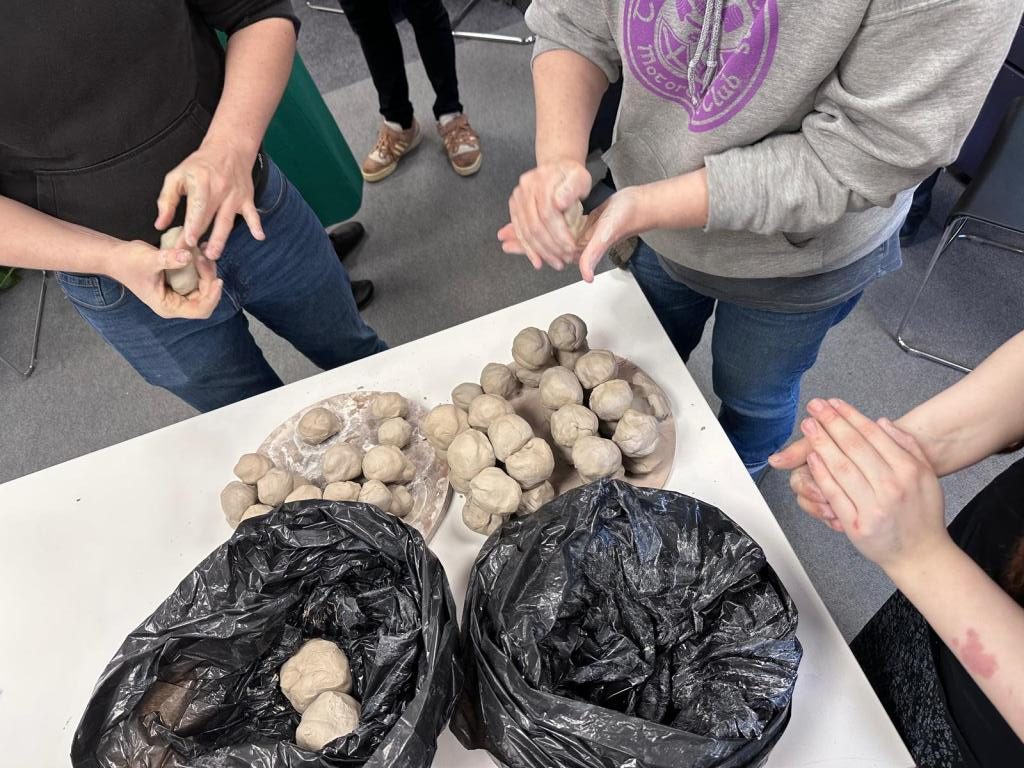
Expanding on your artistic practice
Whilst I was able to be quite experimental and playful in my undergraduate, creating sculptures alongside my paintings, within the Fine Art course of the MA I feel that my mixed media approach and creation of different kinds of objects as well as paintings makes more sense being defined within fine art itself than it perhaps did when I was on the painting course.
Alongside this, I have also found myself making much more use of the facilities and workshops available at Gray’s as a master’s student than I did when studying my undergraduate. I am not necessarily sure why I didn’t utilise all the different areas of workshops at Gray’s, perhaps it was because the undergraduate felt more fast-paced in terms of deadlines, but with the master’s introductions/reintroductions to the workshops and facilities, I have found myself experimenting with so many other ways of making.
Why would I recommend a master’s in Fine Arts?
Overall, I really recommend to do the master’s for many reasons. One of those reasons could be the same as my own, that you wish to hone in on your research some more because you felt there was much more you could do with it. Or perhaps you want to develop your artistic practice further because you learned of some new techniques and didn’t get to explore them fully in the undergraduate. Maybe you want to gain more confidence in your work, and I believe there are a lot of nerves that come with leaving art school and the idea of sustaining your practice and finding a job, and you might just want some more time to decide what you want to do. Maybe your goal is to do a PhD and the master’s is a good stepping stone towards that.
Overall, there are many reasons as I said, and I have so far felt that doing the master’s was a good decision for me and has already been so useful in helping me understand what I want and learn more.
Kirsty MacDonald
Related blogs
Looking back on our experience studying at Gray’s School of Art
My career as a Graphic Designer after studying Communication Design
The post From Undergraduate to Postgraduate studies at Gray’s appeared first on RGU Student Blog.
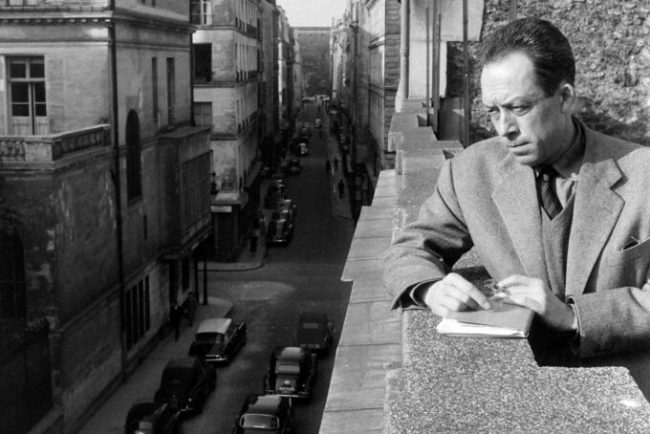
Albert Camus: Intellectual Titan
In 1968 LIFE magazine summed up the appeal of French philosopher and author Albert Camus with a single sentence: “Camus looked directly into the darkness as saw sun—the human spirit.” The line came from a review of Camus’ book “Lyrical and Critical Essays.” And the […]
PeopleIn 1968 LIFE magazine summed up the appeal of French philosopher and author Albert Camus with a single sentence: “Camus looked directly into the darkness as saw sun—the human spirit.” The line came from a review of Camus’ book “Lyrical and Critical Essays.” And the fact that LIFE was reviewing such books at all is a throwback to a time when mainstream American media regularly chronicled the doings of French intellectuals.
LIFE ran its biggest story on Camus in October 1957, right around the time he was awarded the Nobel Prize for Literature for fictional works such as The Stranger, The Plague and The Fall, and philosophical writings such as “The Myth of Sisyphus.” Camus was a mere 44 years old at the time, and he remains the second-youngest person to receive the Nobel Prize for Literature, after Rudyard Kipling.
LIFE’s 1957 story about Camus carried the headline “Action-Packed Intellectual” and began with the note that he “jealously guards his privacy.” But the author relented enough to allow LIFE staff photographer Loomis Dean a rare window into his life. Dean documented Camus at his publishing office, at home with his family, and preparing to direct a staging of his play Caligula. Camus declared to LIFE, “I consider myself an artist first, almost exclusively. What is an artist? Principally a vital force, and of that, frankly, I think I have almost too much. It wears me out.”
The most famous photo from Dean’s shoot—which is also one of the most popular images in LIFE’s online print store—is of Camus standing on the balcony of his Paris publishing offices. Camus looks like an avatar of 1950s intellectual cool. He even takes a drag on a cigarette, a throwback to the days when smoking was less taboo.
In the original story the image of Camus on the balcony ran with this quote from him: “I don’t like to work sitting down. I like to stand up—even at my desk. I probably need to wear myself out.”
It’s the kind of intellectual who could become popular—one who doesn’t take anything sitting down.
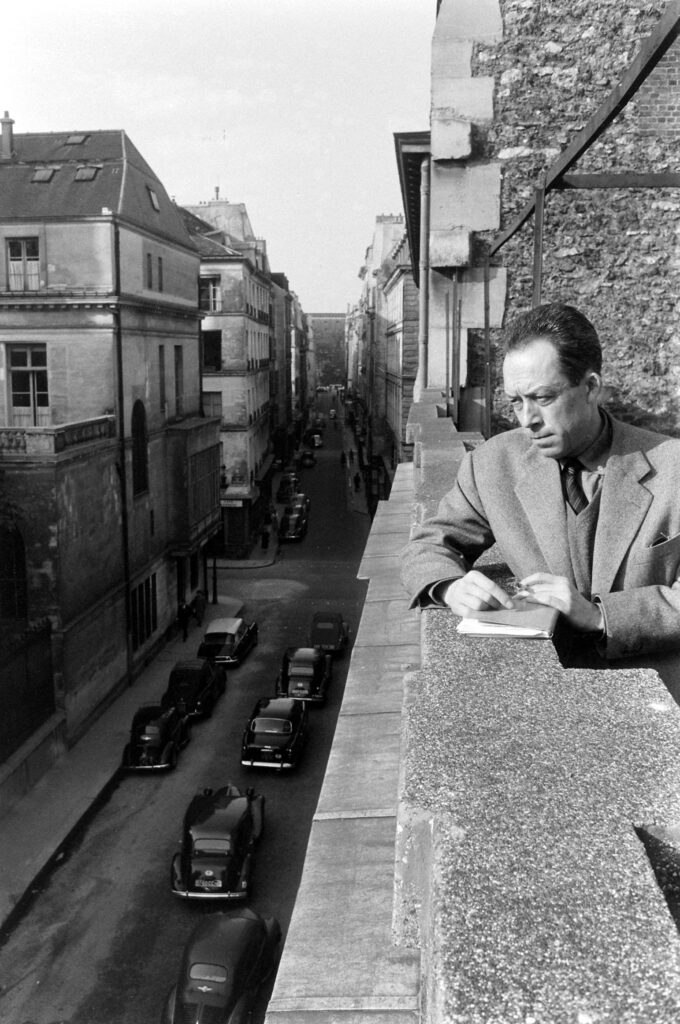
French author Albert Camus at the office of his Paris publishing house, 1957.
Loomis Dean/Life Picture Collection/Shutterstock
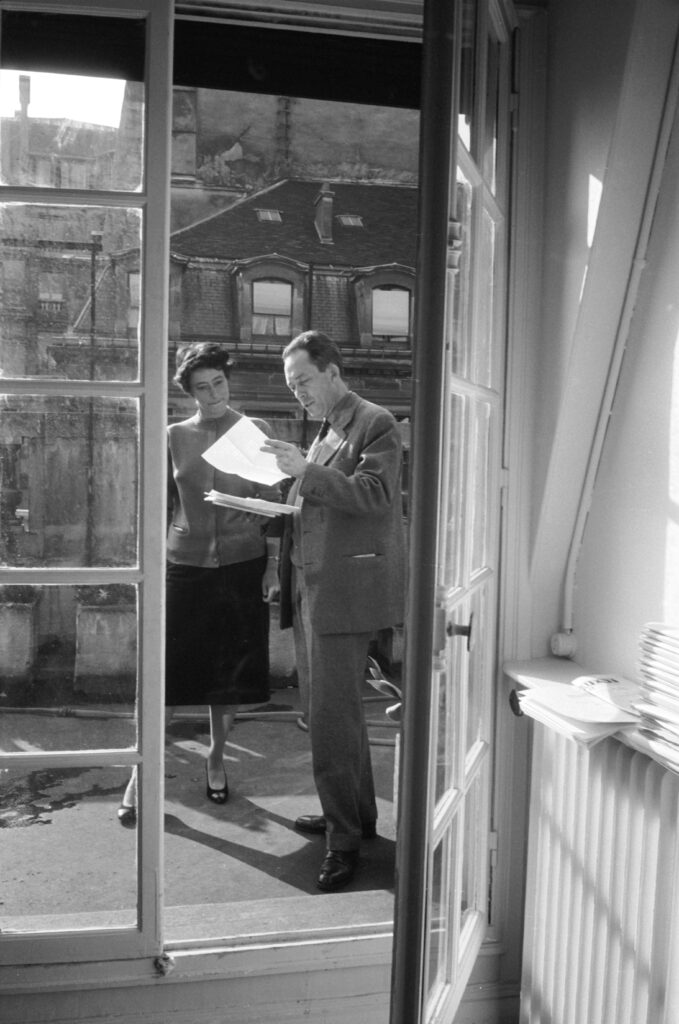
French author and philosopher Albert Camus stands with an unidentified woman and reads one of a number of letters on a balcony outside his publishing office, Paris, 1957.
Loomis Dean/Life Picture Collection/Shutterstock
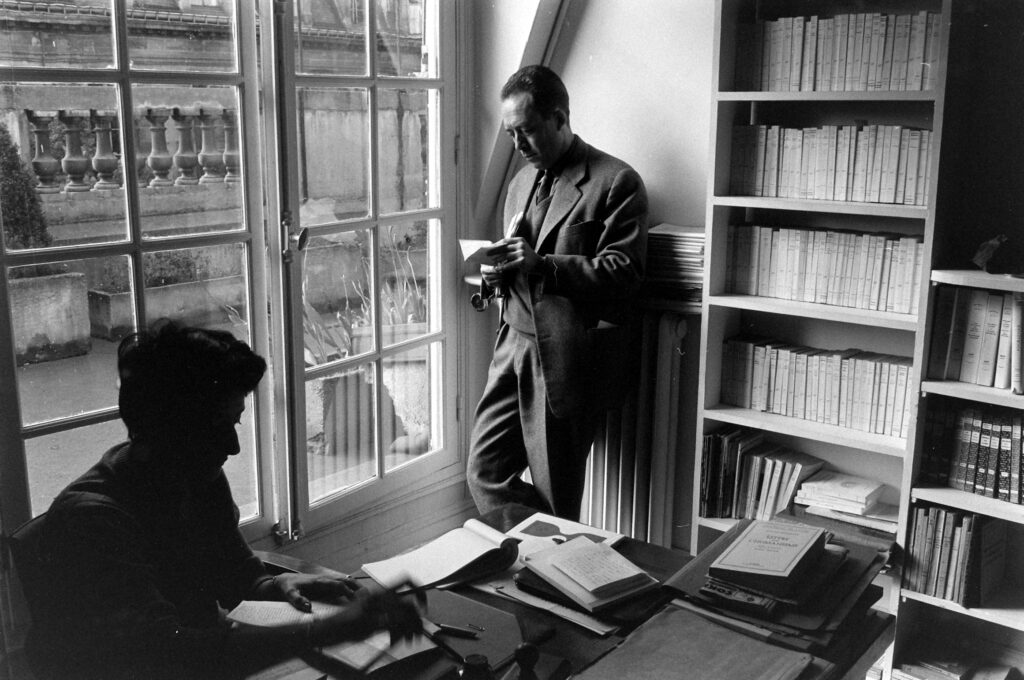
Albert Camus leaned against a radiator in his office, Paris, 1957.
Loomis Dean/Life Picture Collection/Shutterstock
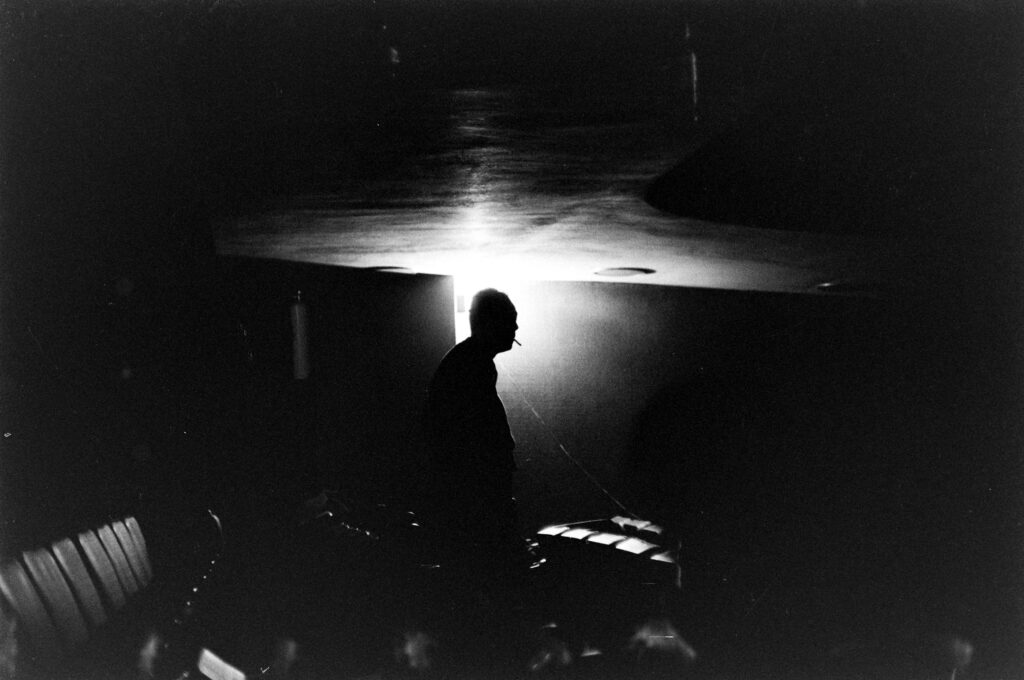
French author Albert Camus, on the set of his play Caligula, 1957.
Loomis Dean/Life Picture Collection/Shutterstock
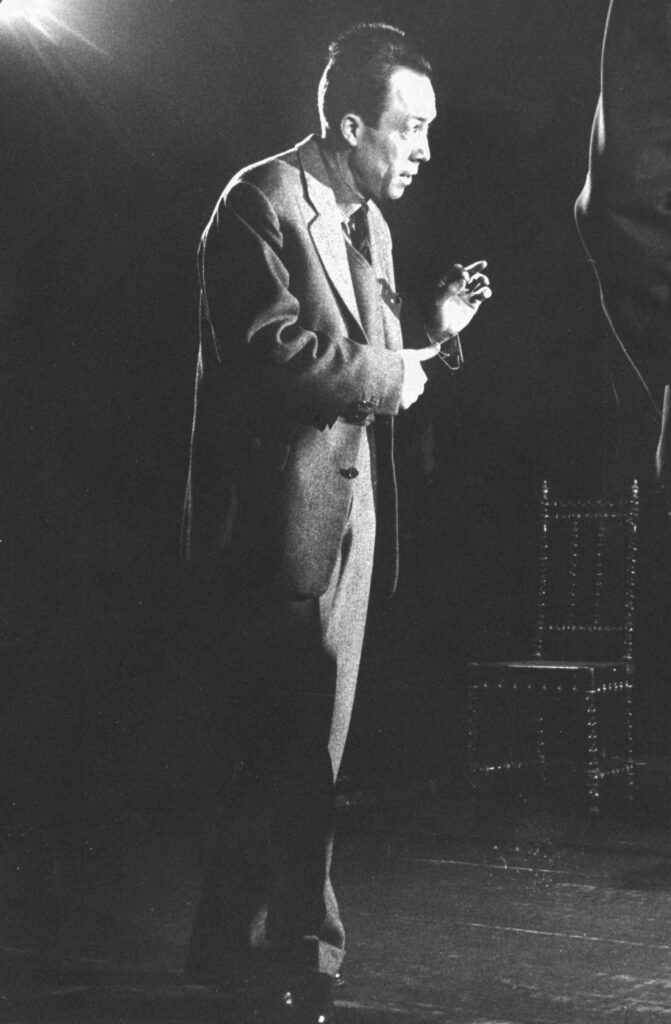
Albert Camus directed a rehearsal of his play Caligula, Paris 1957.
Loomis Dean/Life Picture Collection/Shutterstock
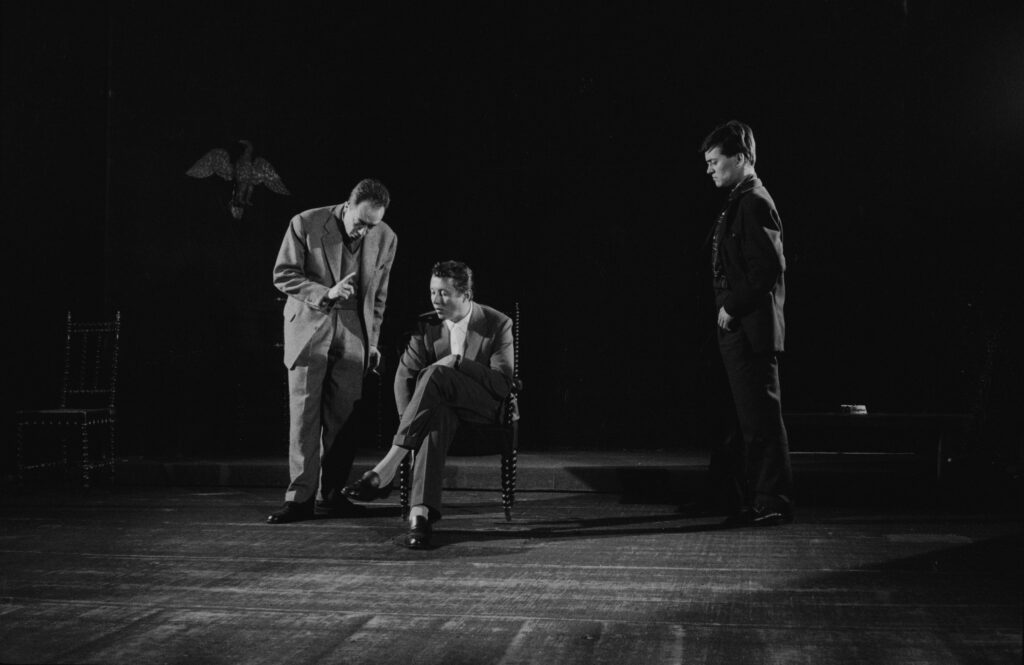
Albert Camus directed actors during a rehearsal of his play ‘Caligula.’ Paris, 1957.
Loomis Dean/Life Picture Collection/Shutterstock
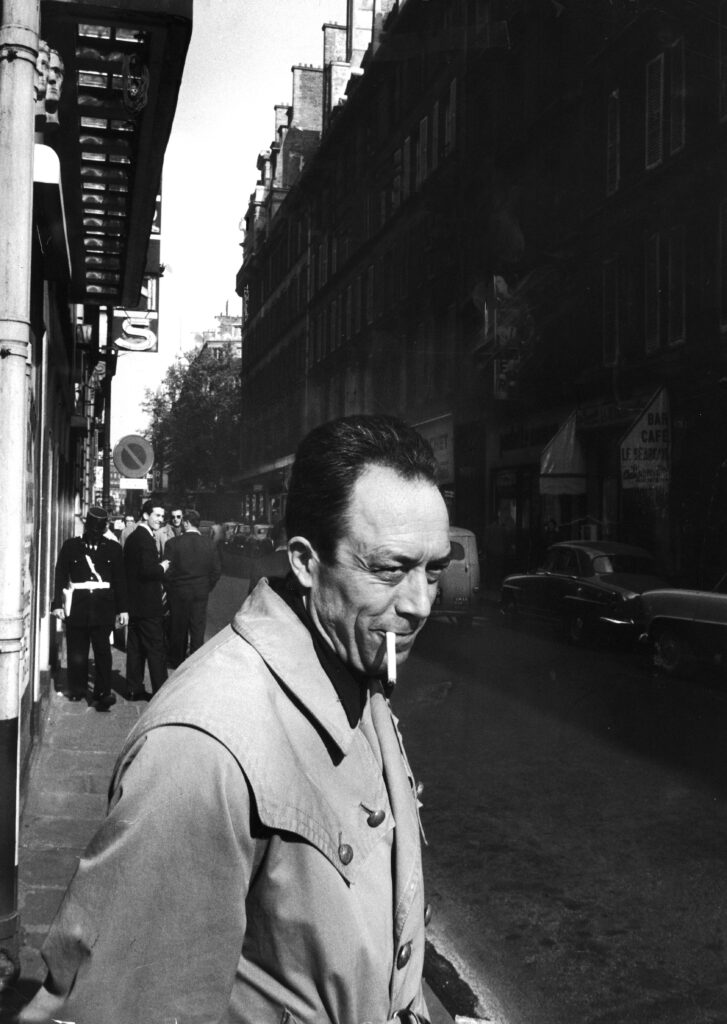
Albert Camus smoked a cigarette outside Theatre des Mathurins, where the rehearsals of his play Caligula were taking place, 1957.
Loomis Dean/Life Picture Collection/Shutterstock
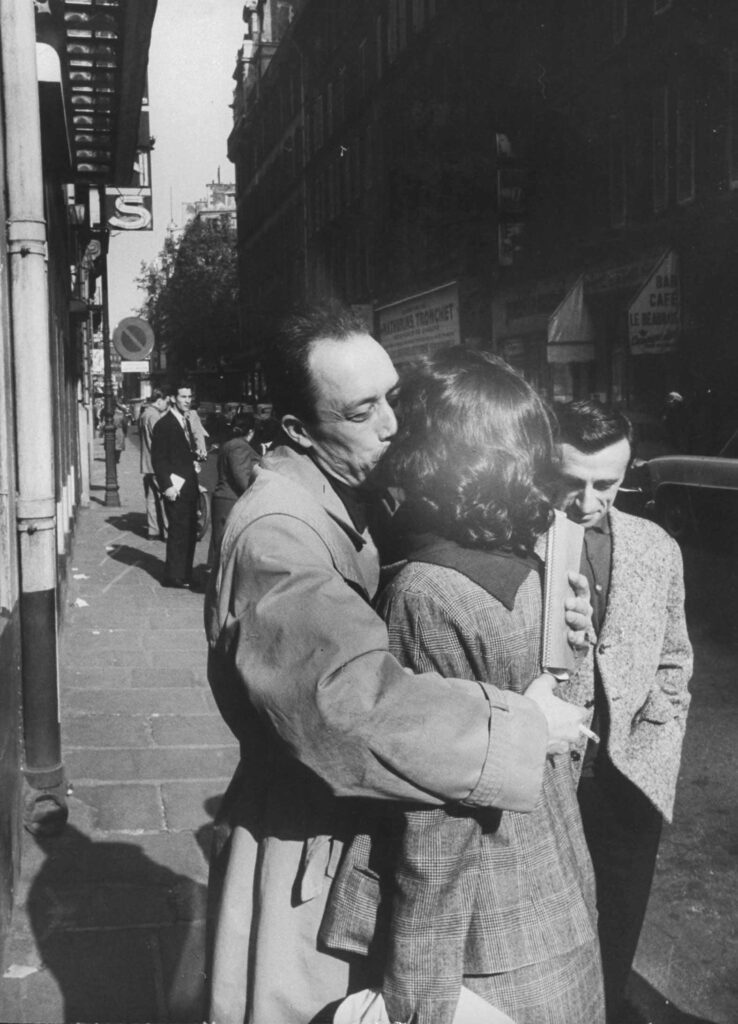
Albert Camus kissed actress Dominique Blanchar after a rehearsal of his play Caligula, 1957.
Loomis Dean/Life Picture Collection/Shutterstock
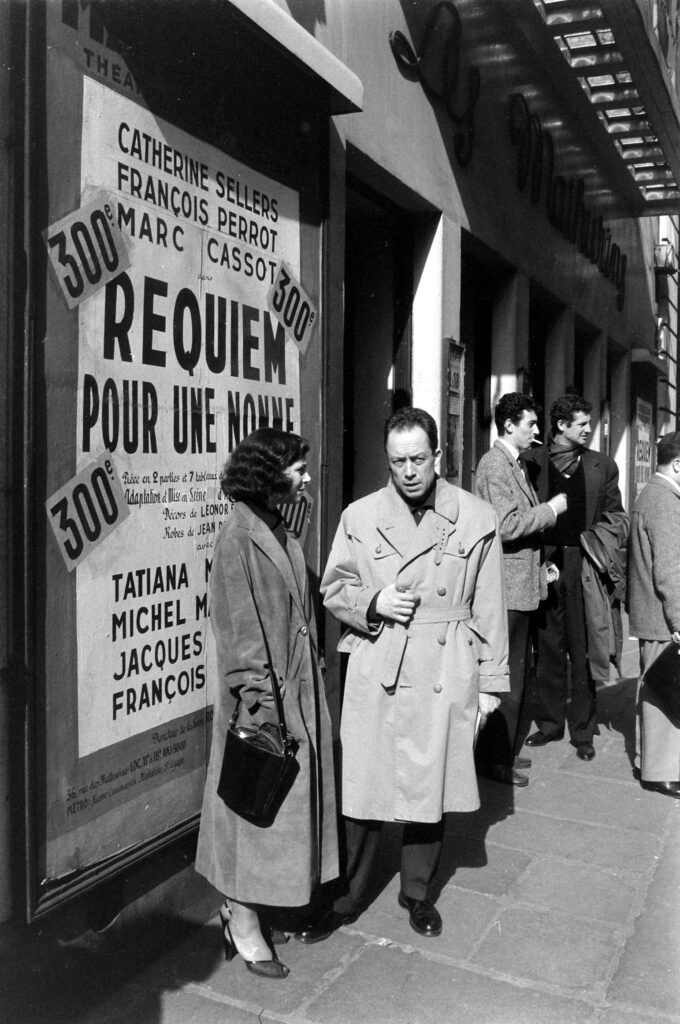
Albert Camus and actress Dominique Blanchar after a rehearsal of his play Caligula, 1957.
Loomis Dean/Life Picture Collection/Shutterstock
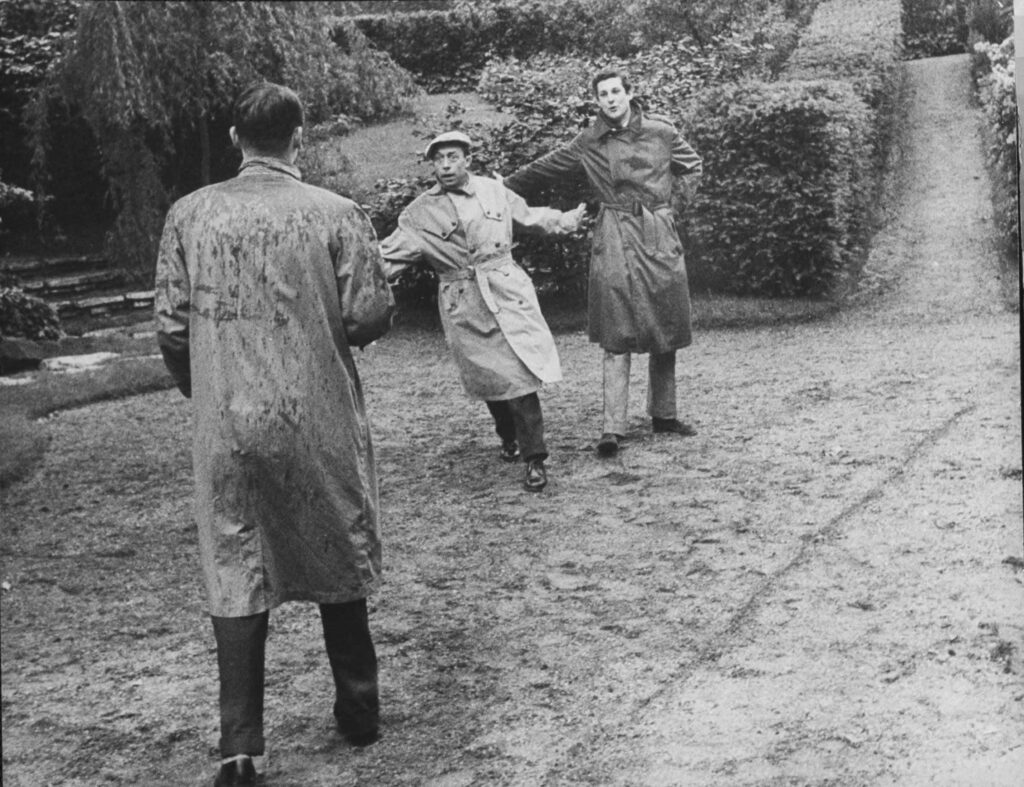
Albert Camus (center) rehearsed with actors for his play Caligula at an outdoor Shakespeare theater in Paris, 1957.
Loomis Dean/Life Picture Collection/Shutterstock
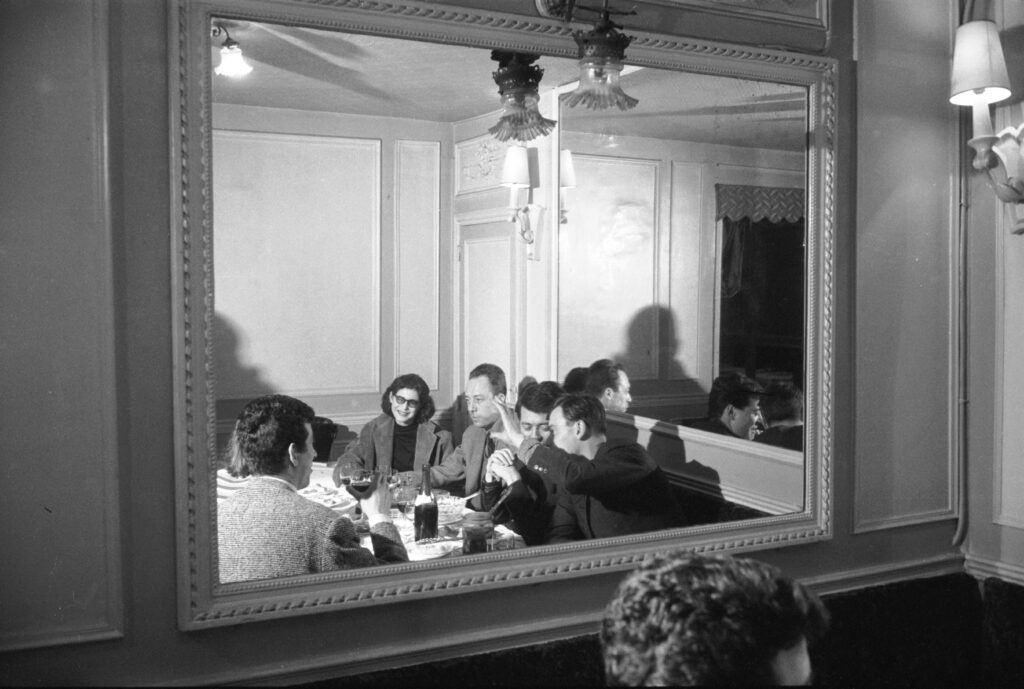
Albert Camus (center, next to woman in glasses) dined with a group at a Paris restaurant, 1957.
Loomis Dean/Life Picture Collection/Shutterstock
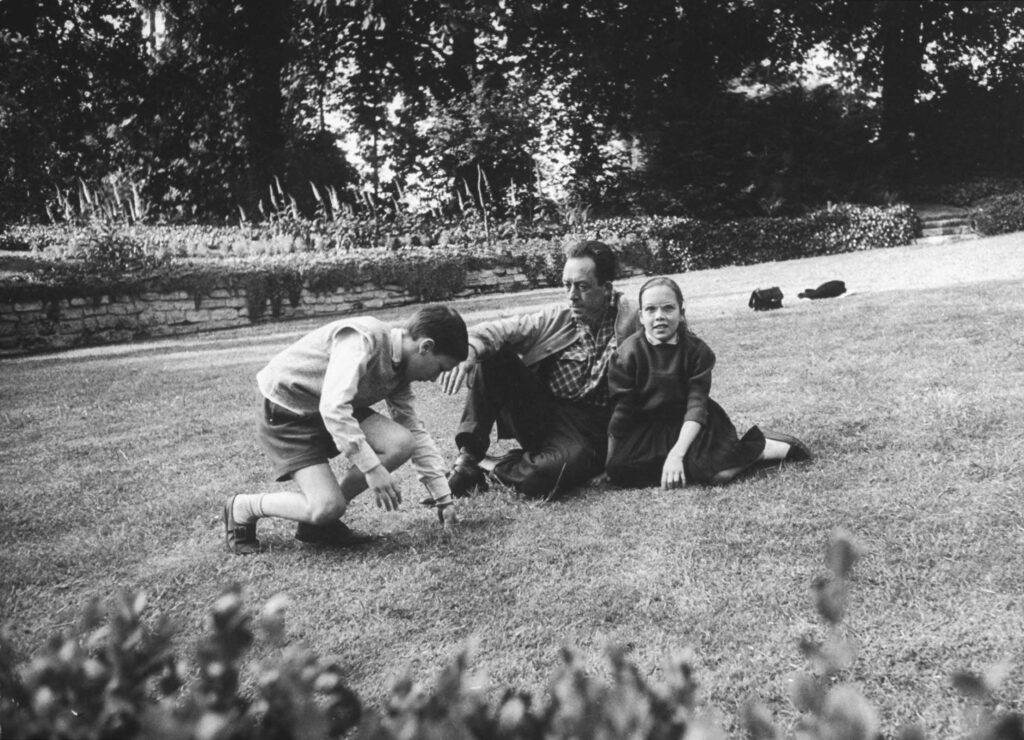
French author Albert Camus sitting in the garden of his Paris home with his 11-year-old twins Jean and Catherine, 1957.
Loomis Dean/Life Picture Collection/Shutterstock
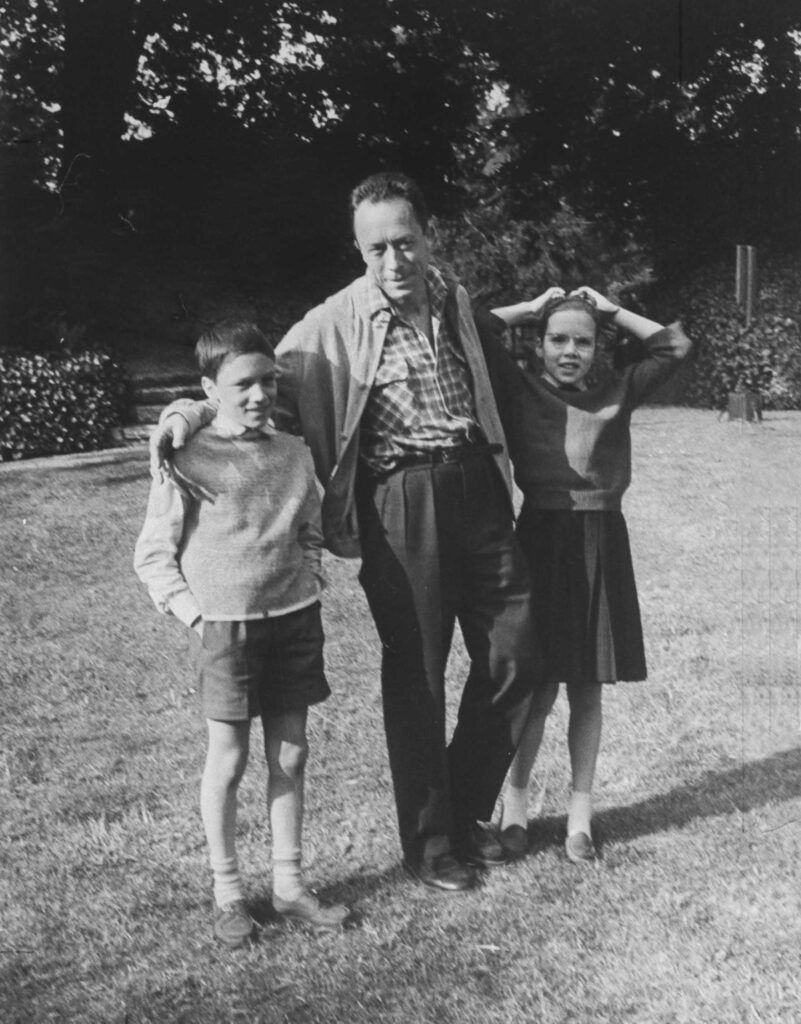
French author Albert Camus poised at home with his 11-year-old twins Jean and Catherine, 1957.
Loomis Dean/Life Picture Collection/Shutterstock
The post Albert Camus: Intellectual Titan appeared first on LIFE.
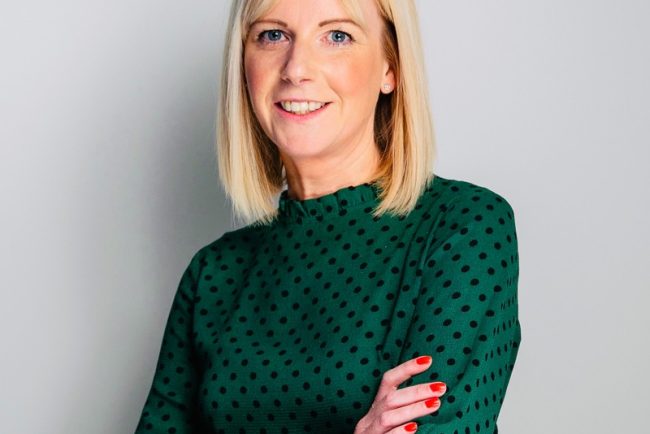
My experience studying a Business Management Graduate Apprenticeship at RGU
RGU offers Graduate Apprenticeship (GA) courses designed around the needs of businesses which allow employees to continue to work while they earn their degree over the course of four years. Emma McGowan, Hire Administrator at STR, is a first-year student on the Business Management GA. […]
StudentRGU offers Graduate Apprenticeship (GA) courses designed around the needs of businesses which allow employees to continue to work while they earn their degree over the course of four years. Emma McGowan, Hire Administrator at STR, is a first-year student on the Business Management GA. She answers our questions about the application process, her experience of the course, and how it has benefitted her and her employer.
How did you first discover RGU’s Graduate Apprenticeship courses?
I first discovered the RGU course when looking for some additional development to expand on my current role. I originally started off looking at the Business Management course at RGU, which I could do online in my spare time. After a conversation with our HR Director Jill, she suggested an alternative version of the course she had recently heard about through Gregg Walker from RGU which would allow me to incorporate my studies with work.
I did some research into it and decided it was something I might be interested in. Gregg came to my workplace to tell me more about the course and to offer me a chance to ask any questions I might have, which I had prepared for.
Can you tell us more about your current role?
My current role at STR is Hire Administrator where I currently deal with the day-to-day admin of our rental equipment as well as the generation of month end invoices. STR are a subsea technology company supporting the energy industry.
How do you think the course will benefit you and your employer?
I hope the course will give me a wider knowledge of the behind-the-scenes workings of the business world. The Graduate Apprenticeship has already given me an insight into areas of the business I wouldn’t have previously been involved in, allowing me to explore new skills and learn new knowledge in different departments of the business.
I believe from taking on this course my employer will see an increase in skill, allowing me to apply my learning into my own role as well as giving suggestions and feedback based on other roles which I collaborate with.
What was your experience like with the application and onboarding process for the course?
The application process was much easier than I had first anticipated, the application form was easy to read and understand. This was then coupled with a copy of my CV and a personal statement. There was no formal interview process as such, myself, my mentor from STR and Gregg had a few meetings between us making sure that the course was the correct fit for me and my employers.
From day 1 of being enrolled on the course I have felt supported by all RGU staff I have come across; all induction information was incredibly clear and all support services very well signposted. The Moodle support page was particularly helpful for me before any of the modules started to give me a feel as to how to use their online services and where to get help if I needed.
I was apprehensive about the induction days, meeting new people and being in a new environment. After the first half an hour of being at the University, I realised everyone was in the same boat and we were all as nervous as each other. I have since formed a good relationship with my study group which I feel has enhanced my experience on the course.
How do you juggle your studies with your full-time work?
I was previously worried about the workload of taking on full time study as well as having a full-time job however, I soon realised that a lot of the work-based learning activities I was able to incorporate into my role with the help of my employer. STR have also been flexible in allowing me to have separated study time to work on my Graduate Apprenticeship, meaning I have felt the transition between full-time learning and full-time work to be easy.
Could you provide examples of how you’ve integrated your studies into your work projects?
The modules have expanded on my communication skills allowing me to integrate new ideas into my workplace. I feel I have had to be more proactive in engaging with other departments at work discussing areas of the business which have innovated new ideas and created efficiency opportunities.
Were there any hurdles in beginning your studies on the Graduate Apprenticeship course, and how have you addressed them?
One of the things I found difficult was the academic writing and referencing part of the assessments. But after discussing with my study group, I found that I wasn’t the only one experiencing this. We shared resources we had found useful from the study skills section of the Moodle as well as accessing support from tutors.
Anything else you would like to add?
RGU has been incredibly supportive so far and I am looking forward to completing the next few years of my course. I feel the content of the course so far has been really interesting and relevant to how I see my professional development progressing going forward.
Emma McGowan
A word from Jill Williamson, HR Director at STR
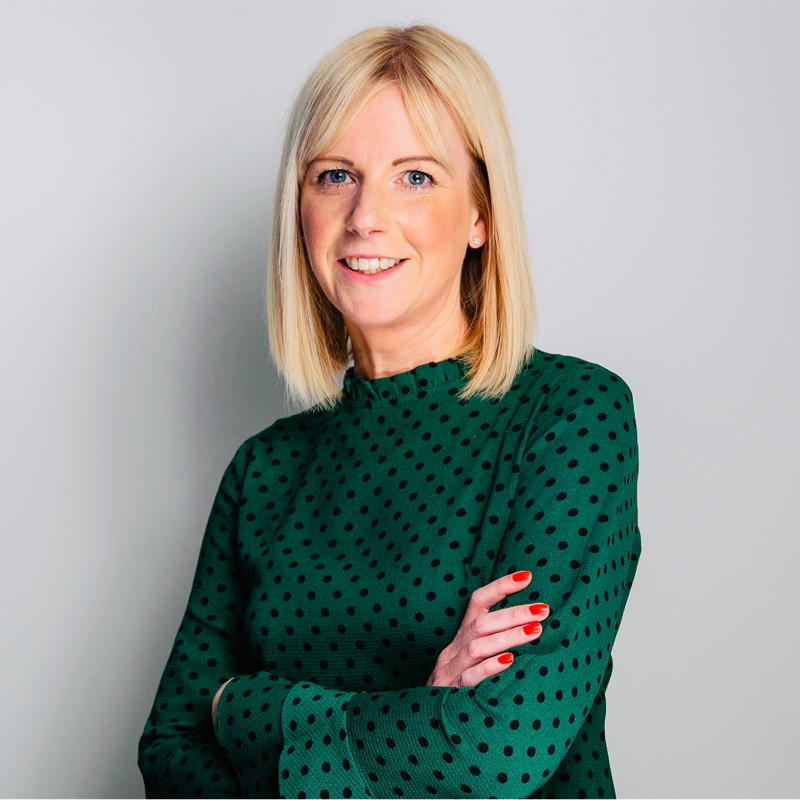
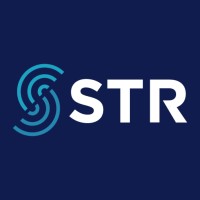
Engaging with RGU to support Emma to accelerate her learning through the GA programme has been fantastic. Understanding how the course was structured and the supported learning RGU offers was fundamental when we agreed with Emma that this was the right course for both her and STR.
We have worked with Emma to ensure she is able to focus on delivering her role to a high standard in conjunction with her course work and we are exceptionally proud of the commitment she has shown, which has been reflected in her excellent results.
Related blogs
Studying an MBA online at RGU while working full-time
Studying MSc Business Innovation and Entrepreneurship at RGU
The post My experience studying a Business Management Graduate Apprenticeship at RGU appeared first on RGU Student Blog.
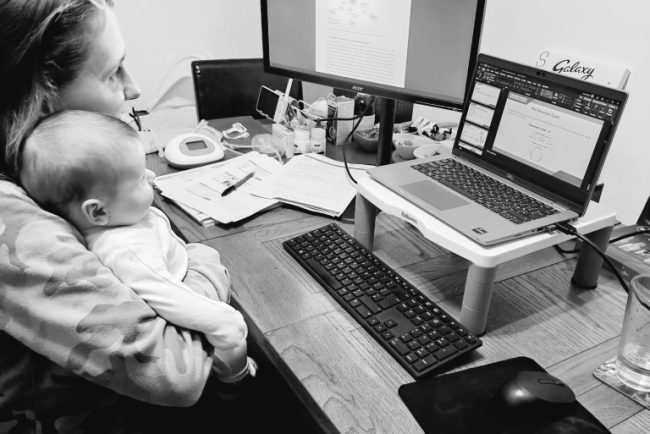
Studying an MBA online at RGU while working full-time
MBA graduate Fiona shares her experience studying online at RGU and juggling university with a full-time job and new-born. My background Hi I’m Fiona, I live in Aberdeenshire and work in integrity monitoring in the oil and gas industry and have undertaken various science-based roles […]
StudentMBA graduate Fiona shares her experience studying online at RGU and juggling university with a full-time job and new-born.
My background
Hi I’m Fiona, I live in Aberdeenshire and work in integrity monitoring in the oil and gas industry and have undertaken various science-based roles from lab work, offices, to rotational offshore shifts, since graduating from my first degree at Robert Gordon University in Forensic Science with Chemistry in 2010.
I wanted to learn more about business management and submitted an application to study at RGU for the part-time, online MBA course which was successful. I then joined the cohort in September 2022.
My experience studying flexibly online
The course lectures were held in the evening, which allowed me to log on after finishing work. The course being online-based gave the flexibility to watch the lectures at a later time that was more suitable on occasions when I could not join the live sessions, as the presentations were uploaded onto the university portal.
The coursework dates were mentioned early in the semester to allow students to plan ahead and meet the submission deadline. During the second semester, I became pregnant and juggled the end of the course with a new-born which was challenging at times.
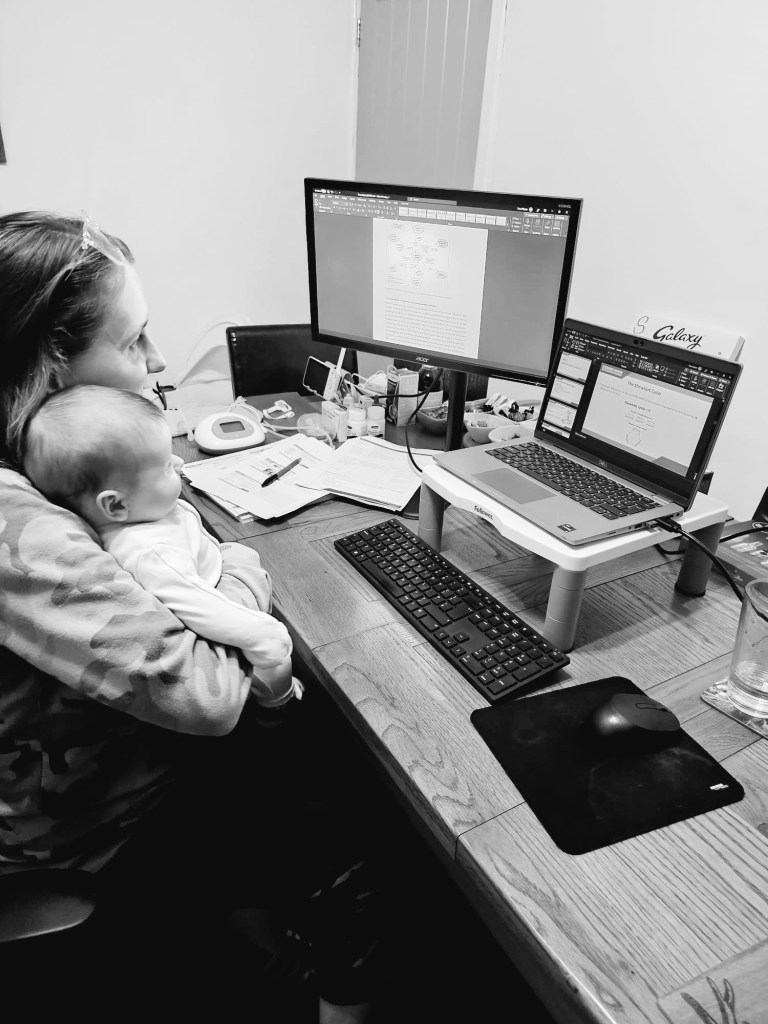
The highlight of the MBA course was meeting the RGU lecturers and fellow students in person during Leadership Week who travelled lengthy distances to be in Aberdeen for the occasion. This was an intense week in which I learned a lot from the lectures, guest speakers, group work and business simulation.
The final consultant project was also a highlight of the degree which allowed me to contribute to my employer with a research project by guidance from an RGU project supervisor. Once this was completed, I presented my project to my colleagues. It was great to share my research and put it into practice.
Finally, the graduation was a great sense of achievement to celebrate the completion of the degree with fellow students and my family. I now look forward to applying my learnings to my career.
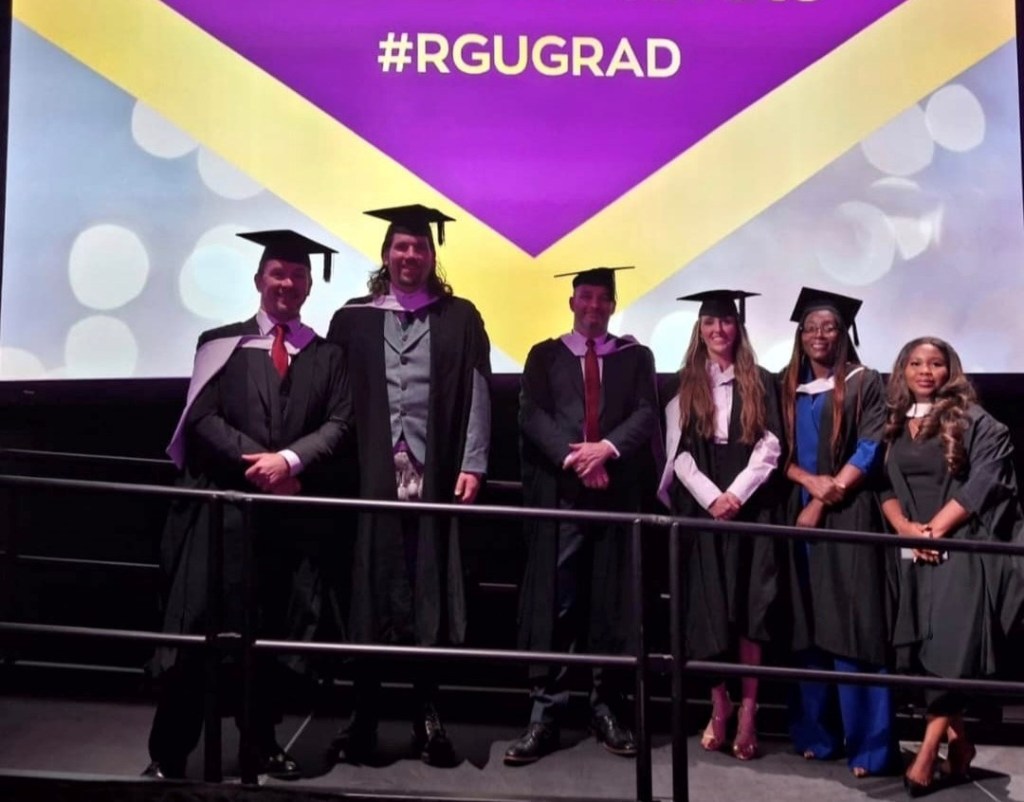
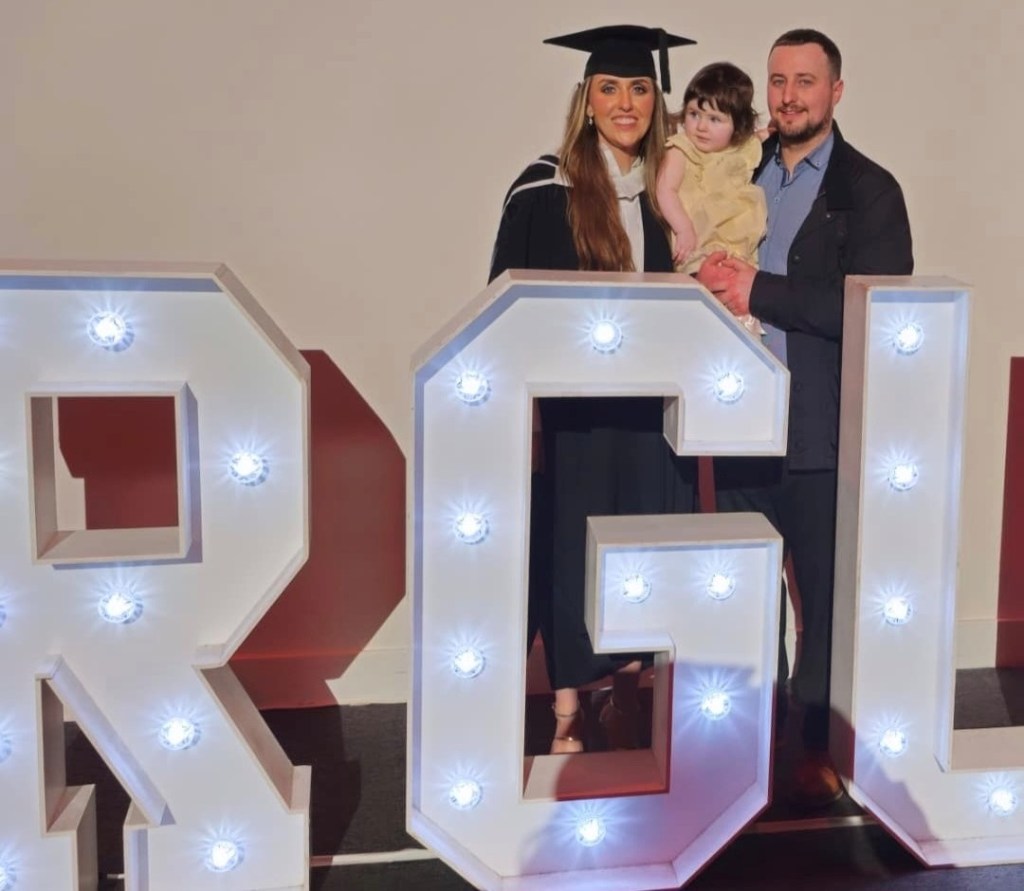
Fiona Eyre
Related blogs
Doing an MBA or starting a family? I chose both!
The post Studying an MBA online at RGU while working full-time appeared first on RGU Student Blog.
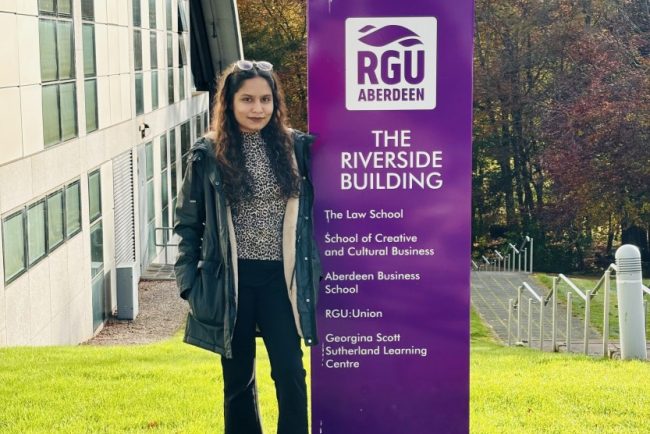
From recruiting students in India to becoming one at RGU
International student Twinkle quit her job in student recruitment in India and moved to Aberdeen to study a master’s in Digital Marketing. She shares how her role recruiting students inspired her to go back to university and her experience adapting to life in Scotland. Life […]
StudentInternational student Twinkle quit her job in student recruitment in India and moved to Aberdeen to study a master’s in Digital Marketing. She shares how her role recruiting students inspired her to go back to university and her experience adapting to life in Scotland.
Life has an uncanny way of coming full circle. My journey from recruiting students in India to becoming a student myself has been one of the most profound and humbling experiences of my life. It’s a story of transitions, challenges, and the incredible growth that comes when you step out of your comfort zone. In this blog, I’ll take you through the highs and lows of this transformation, share real-time facts from my experiences, and reflect on what this journey has taught me.
My passion for education and guiding students started early in my career. As someone who has always believed in the power of education to transform lives, I found immense joy in helping students navigate their academic paths. I always had good communication and convincing skills, which I made the best use of in counselling and continuously upgrading my skills. For years, I worked as a Senior Admissions Counsellor, engaging with students and parents, addressing their concerns, and matching them with the right opportunities.
I helped countless students shape their futures, and the satisfaction of seeing them succeed was deeply fulfilling. However, along the way, I realized that I, too, longed for growth and new experiences. I wanted to step into the very world I had been advocating for—to become a student once again and gain a fresh perspective on higher education.

The beginning: My career path and recruiting students in India
My career began with a strong foundation in education. I completed my Bachelor of Computer Applications (BCA) in 2018, followed by an MBA in 2020. Soon after, I stepped into the professional world as a Senior Admissions Counsellor, recruiting students and guiding them through their educational journeys. This role demanded a deep understanding of young minds, the ability to empathize with their aspirations, and the skills to guide them toward their dreams. Each day, I worked with students and families navigating the maze of educational opportunities. It was both fulfilling and challenging.
I vividly remember the pride in a student’s eyes when they received an offer from their dream university, and the relief in parents’ faces when their child’s future felt secure. But it wasn’t always smooth sailing. Convincing students to step out of their comfort zones and helping families overcome financial and emotional hurdles were significant challenges. Still, the work was meaningful, and I loved being a part of their journey.
The turning point: Becoming a student
Despite the rewarding nature of my work, there was always a part of me that longed for personal growth—to experience the very journey I was advocating for. This inner calling led me to take a bold step: I decided to pursue higher studies myself.
Making this decision was not easy. Questions plagued me: Was I too late to go back to being a student? Could I adapt to the academic pressures and cultural shifts of studying abroad? Would I regret leaving a stable career? Ultimately, the desire to grow and learn won out over fear, and I embarked on this life-altering path.
Throughout this journey, I was fortunate to have the unwavering support of my parents, my boss and my managers. They not only motivated me but also stood by my decision, ensuring I never doubted myself. Their encouragement helped me choose MSc Digital Marketing—a flagship course in today’s digital-first world. Their belief in my potential played a pivotal role in helping me take this leap of faith.
Choosing MSc Digital Marketing as my career path felt natural. I have always been passionate about creating content, whether it was making social media posts, crafting engaging reels, or coming up with creative ideas. This interest in digital creativity made Digital Marketing an ideal subject for me, and I’m thrilled to have taken this step.
Why I chose RGU
Choosing Robert Gordon University (RGU) as my priority university felt personal from day one. The connection between RGU and my organization was always very strong, which made me choose RGU without any second thought. After spending three years recruiting students to RGU for their bachelor’s and master’s programmes, I had an in-depth understanding of the University’s values and offerings.
RGU consistently stands out for its high student satisfaction and excellent employment rates. I also received glowing feedback from previously recruited students who spoke highly of their experience at RGU. These factors, combined with my familiarity and trust in the institution, solidified my decision to join. It felt like a natural continuation of my journey.
Adding to this, I was also chosen to be a Student Ambassador for RGU, which gave me a wider space to be a part of the University and truly immerse myself in its culture. This was an incredibly prideful moment for me, as it allowed me to represent the University and help new students navigate their own journeys.
Living in Aberdeen: A dream come true
Aberdeen is a city where culture and sophistication meet, making it a truly unique place to live. Every day, I wake up to a beautiful new view of the city, and each day feels like a dream come true. The city’s charm lies in its blend of history, modernity, and stunning landscapes.
Aberdeen has its own distinct vibe—one that is warm and welcoming. The people here are incredibly kind and supportive, which has made my transition so much smoother. Walking through the quaint streets, exploring the coastline, and experiencing the vibrant student community have all made me feel at home. I am immensely grateful for choosing Aberdeen as the city to live in, as it has enriched my journey in ways I never imagined.
Back in India, I never thought I would experience my life’s first snowfall in the UK, and trust me, it was all worth it. My beautiful city was covered in snow, and every walk was mesmerizing. It felt like a dream to see Aberdeen draped in white, making my experience here even more magical.


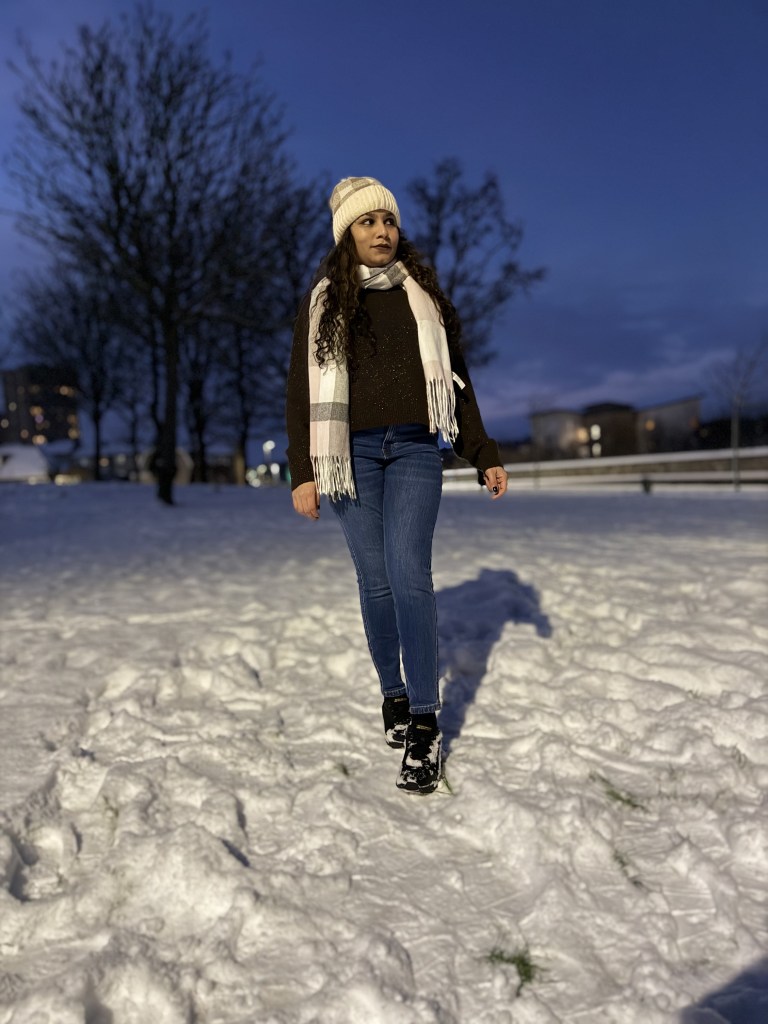

Struggles and challenges faced
Transitioning from a recruiter to a student was humbling, to say the least. Suddenly, I was on the other side, grappling with the very uncertainties I had once helped others navigate.
Cultural Adjustments: Moving to a new country meant adapting to different customs, teaching styles, and social norms. It was both exciting and overwhelming.
Academic Pressure: The rigor of coursework, coupled with the need to excel, was a sharp contrast to my professional routine. Time management became a daily battle.
Emotional Hurdles: From missing home to questioning my decision during tough times, the emotional weight was significant. I often found myself reflecting on the students I had guided and gaining a newfound respect for their resilience.
Financial Management: Balancing tuition fees, living expenses, and part-time work added another layer of complexity to the journey.
Lessons learned along the way
Despite the struggles, this experience has been incredibly enriching. Here are some of the key lessons I’ve learned:
Empathy Deepened: Experiencing the challenges of being a student first-hand has made me more empathetic. I now understand, on a visceral level, the courage it takes to leave behind familiarity in pursuit of education.
Perspective Gained: Being a student again reminded me that learning is a continuous journey. It’s not just about acquiring knowledge but about personal growth and adaptability.
Humility and Resilience: The setbacks I faced taught me to stay grounded and persistent. Each obstacle became an opportunity to grow stronger.
Moments of joy
For all the challenges, there were countless moments of joy that made the journey worthwhile:
Building Friendships: I formed bonds with classmates from around the world, learning from their diverse experiences and perspectives.
Achieving Milestones: From acing difficult exams to completing projects, each accomplishment felt like a personal victory.
Personal Growth: The confidence I’ve gained through this journey is immeasurable. I’ve discovered strengths I didn’t know I had.

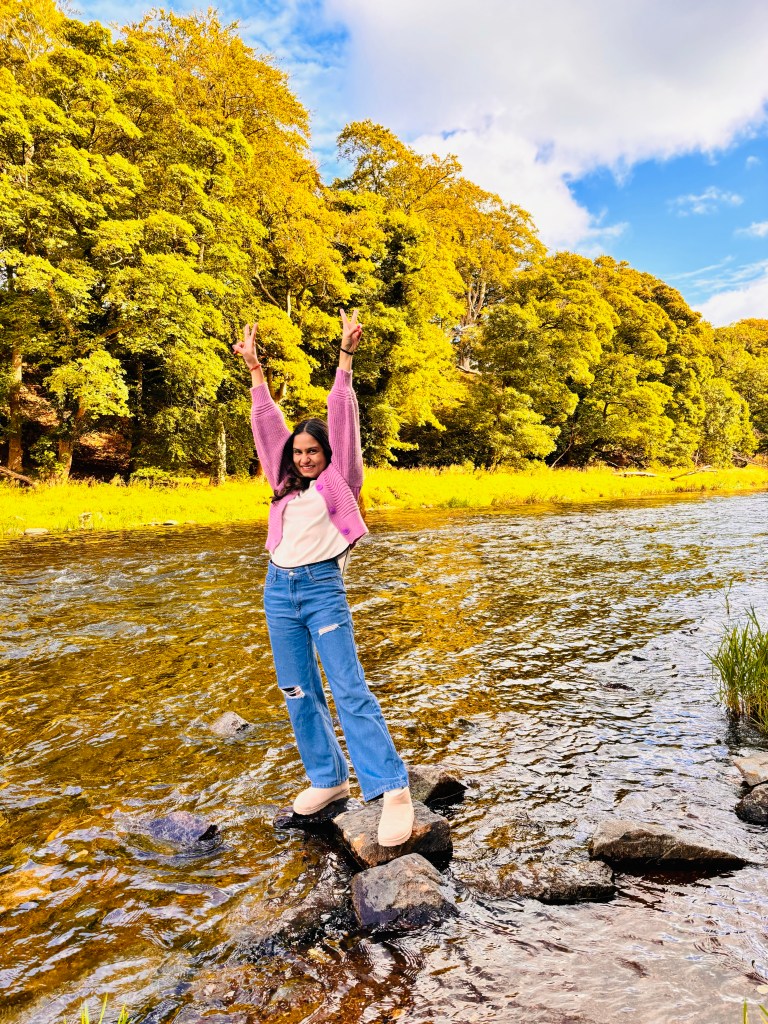
Reflections on the journey
Looking back, I’m filled with gratitude for the path I chose. Transitioning from a recruiter to a student has given me a unique dual perspective. I now see the education system through two lenses—as someone who once guided students and as someone who’s experienced their struggles firsthand.
If I could offer advice to anyone considering a similar path, it would be this: Embrace change. Growth happens when you challenge yourself, even when it’s uncomfortable. The courage to step out of your comfort zone can lead to some of the most rewarding experiences of your life.
Conclusion: The dual perspective
My journey has come full circle, and I wouldn’t have it any other way. Being both a recruiter and a student has given me insights I could never have gained otherwise. As I look toward the future, I’m excited to blend these experiences—to guide others with empathy and to continue learning with an open heart.
To anyone reading this: “Conquer your dreams” Keep chasing them, and don’t be afraid to reinvent yourself along the way. Life has a way of surprising you, often in the best ways possible.
Here’s signing off…
Twinkle
Related blogs
A Greek in Scotland studying Architecture at RGU
My journey from Canada to Aberdeen and RGU
Swapping the Baltic Sea for the North Sea – My hopes and fears
The post From recruiting students in India to becoming one at RGU appeared first on RGU Student Blog.


